“Memorial Day, or Decoration Day, is a federal holiday for remembering people who died while serving in the country’s armed forces.” Wikipedia
I originally wrote this back in November 2015. I think it’s worth a repeat, especially today, May 27, 2019…Memorial Day…because there were more who died serving in this country’s armed forces who did not die in battle, but whose names should be remembered. Though I have made some corrections, and an addition to this version, the story remains unchanged:
Friday, November 6, 2015, was an important day for me because I discovered the name of the nineteen-year-old young man who died in my room at Elmendorf Air Force Base hospital from burns over 95% of his body the night of November 27, 1970, the day our plane crashed on take-off from Anchorage International Airport and killed forty-seven people. For some reason, I decided to try to find more information on that ill-fated Capitol International Airways (Capitol Airlines) flight C2C3/26 that took off from McChord AFB, Tacoma, Washington, with scheduled fuel stops in Anchorage, Alaska and Yokota, Japan, before reaching its destination at Cam Ranh Bay, South Vietnam. For many, it was their first trip there. I was returning for another tour.
Why is this important to me? It is important to me because within the space of eight hours, that young man’s life and my life touched three times and left an indelible memory. I just couldn’t remember his name for all these years, though I’ve thought of him so often.
How did this begin?
After my mom and dad dropped me off at the McChord AFB terminal in the early afternoon of November 27, 1970, the Friday after Thanksgiving, I walked into the terminal carrying my duffle bag. I never expected that I would see either of them again. I was going back to Vietnam to probably die there. I felt that I had little left to lose at that point in my life. I heard some scuffling, name-calling and taunting to my left after I walked through the double glass doors and saw three guys in fatigues pushing and poking at a larger young man, making fun of his weight and his Number 1 haircut, a buzz-cut. I saw no insignia on his fatigues, so I assumed they were ganging up on a Private. I was correct. One of the bullies took his cap and threw it on the floor and said to him, “What are you gonna do about that, Fat Boy?” He backed up against the wall with his hands in front of him as though he was trying to keep them at arm’s length and said, “C’mon, guys. You don’t have to be this way.” They laughed at him and began to move toward him again.
I walked to their right, dropped my duffle bag against the wall to the young man’s left, turned and slid in front of him. He was at least half a head taller than I, but a large, gentle soul. I stood between him and the three approaching bullies and conversationally said, “Why don’t you pick on someone your own size…like me?” And then I smiled at them. They stopped, rather startled. I looked them over, looked directly at the biggest of them, and said, “You first.” He was about the same height as the young man behind me with his back to the wall, but more slender. I said to him, “C’mon. You’re first before I start on the other two. Unless either of you two,” I nodded to them, “want to jump right in.” I was standing with my legs slightly apart and with my arms at my sides. They all took a step back, and the tall one said, “We didn’t mean anything by it. We were just teasing him.” I said, “I’m not teasing you. Now pick up his cap and hand it to me nicely…and apologize to this young man. Now.”
The tall one picked up his cap and handed it to me. “Apologize,” I said staring at him. With mumbled apologies they backed away, picked up their duffle bags and walked away. I turned to the young man, handed him his cap and asked if he was okay. He said he was and said I didn’t have to do that. I told him that I did because no one deserved to be picked on like that. He thanked me. We picked up our duffle bags and began walking to the seating area to await our flight. I asked him his name and he told me, and we talked. He said he was nineteen years-old and was from Houston, Texas. He said that the first time he’d really ever been away from home was when he went to Basic Training, and this was the farthest he’d ever been away from home. He was a nice kid, polite, gentle, and wide-eyed at being somewhere he’d never been before. Though I’d heard the three bullies swearing at this young man and calling him names, he never once swore back or called them names. He had tried to talk his way out of the bullying. That’s when I arrived. We didn’t have long to talk because the PA system crackled to life as we were headed for the seating area and the voice told us to begin boarding. I wished him good luck and promptly forgot his name.
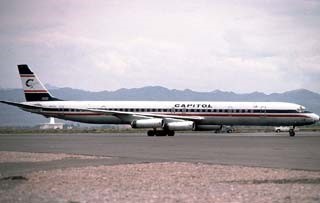 The flight to Anchorage was sort of uneventful, though it took most of the runway at McChord to get that plane off the ground. It was not a confidence-builder. The McChord runway, as I remember it, was about 10,000 feet long. Somewhere close to the 8,000-foot marker was a rise in the runway, a small hill. As we cleared the hill, the plane actually dipped below the top of the hill before we felt it ‘catch’ and begin to gain altitude. The wheels were pulled up almost immediately. I heard someone say that these DC ‘Stretch’ 8s were notoriously underpowered. Yes, a real confidence-builder. Somewhere close to a couple of hours into the flight, the far-left engine (number 1?) began to smoke, and I had thought it was shut down. I could be mistaken, though.
The flight to Anchorage was sort of uneventful, though it took most of the runway at McChord to get that plane off the ground. It was not a confidence-builder. The McChord runway, as I remember it, was about 10,000 feet long. Somewhere close to the 8,000-foot marker was a rise in the runway, a small hill. As we cleared the hill, the plane actually dipped below the top of the hill before we felt it ‘catch’ and begin to gain altitude. The wheels were pulled up almost immediately. I heard someone say that these DC ‘Stretch’ 8s were notoriously underpowered. Yes, a real confidence-builder. Somewhere close to a couple of hours into the flight, the far-left engine (number 1?) began to smoke, and I had thought it was shut down. I could be mistaken, though.
Regardless, we arrived safely in Anchorage and deplaned while it was being fueled and one of the engines was inspected after the cowling was removed. I suspected it was that far left engine. It was cold and ice covered the runway. I thought I heard we had taken on 69,000 lbs of fuel, but later found out we took on over 117,000 lbs of fuel. When we boarded, once again I boarded late and noticed there were women and children…dependents…on board, possibly going to Yokota, Japan to be with their husbands and fathers. I found a seat in the tail section of the plane, about three or four rows from the back, on the starboard side by the aisle. I noticed that the young soldier I’d met in the McChord terminal was seated in the same row, but across the aisle in the center seat. We nodded a greeting to each other as I took my seat. Though we left the terminal and sped down the runway, the plane never left the ground.
 Minutes later, after the plane had skidded 3,400 feet past the end of the runway and was in flames with the tail section torn off, we crossed paths once again. After we were either ejected from the plane or crawled out of the wreckage, several of us were on the ‘wrong’ side of the plane, near the still-intact right wing with fire burning all around it. Someone on the other side of the wreckage shouted, “Hey! Over here! This way!” I could see him between the tail section and main fuselage of the plane. They were thirty or so feet apart and a fire had bridged the gap. I could hear him yelling and waving his arms, so I turned around and spotted about five or six others milling around in a daze, so I yelled at them to follow me. I made sure I had their attention before I turned, ran toward the gap and dove through the flames to the other side. I rolled to my feet and began to yell, “Come on! This way! Run!” and they did.
Minutes later, after the plane had skidded 3,400 feet past the end of the runway and was in flames with the tail section torn off, we crossed paths once again. After we were either ejected from the plane or crawled out of the wreckage, several of us were on the ‘wrong’ side of the plane, near the still-intact right wing with fire burning all around it. Someone on the other side of the wreckage shouted, “Hey! Over here! This way!” I could see him between the tail section and main fuselage of the plane. They were thirty or so feet apart and a fire had bridged the gap. I could hear him yelling and waving his arms, so I turned around and spotted about five or six others milling around in a daze, so I yelled at them to follow me. I made sure I had their attention before I turned, ran toward the gap and dove through the flames to the other side. I rolled to my feet and began to yell, “Come on! This way! Run!” and they did.
Two or three made it through the flames unscathed, but the next one didn’t. As he ran through the fire, he burst into flames and kept running. Several of us chased him down, tackled him and smothered the fire with our bodies. The remaining soldiers made it through the fire. We were the fortunate ones. We helped him up, and I was appalled because he was totally blackened from head to foot. It was that Private that I’d stepped in front of at the McChord AFB terminal. Behind us, across the (estimated) twelve-foot-deep by about twenty-five-foot-wide drainage ditch, trucks, cars, buses and ambulances began to arrive. Just then, I heard a loud “whump” behind us and turned to see a geyser of flame erupt from the right wing, over 100 feet high, close to where we were milling around just minutes before. We turned and made our way into the ditch and across it to the transportation. I made sure he got into a vehicle and then got into a pickup that had just pulled up. I realized my feet were cold because I wasn’t wearing my shoes and socks. Most of the plane was now fully engulfed in flames.
Many of us ended up at one of the airport fire stations before we were loaded onto hospital buses to be taken to the hospital. By that time, I knew my hair had been burned off, my face had been beaten to a pulp, I had been ripped out of my shoes and socks by the impact when my seat tore out of the floor of the plane, three toes on my right foot and two toes on my left foot were frostbitten, and both of my hands were burned bad enough to have shreds of skin hanging off them. I was also soaked to the skin in jet fuel. It was about an hour later that I was on a gurney in one of the corridors of Community Hospital. My uniform was cut off me, I was completely washed down with saline solution, given a shot of morphine and dressed in a hospital gown. I lay there for about half an hour before I was loaded onto a stretcher, strapped down, and loaded onto a hospital bus with others to be taken to Elmendorf AFB hospital.
I eventually ended up in a room with three or four others, was drugged again, the excess skin cut off my raw and burned hands, my hands were bandaged, and I was given an IV drip. Across the room, perpendicular to my bed, was a bed with a person with the most severe third degree burns I’d ever seen. His face, his neck, his arms, torso and legs were blackened. In my drug-induced stupor, I could still see it was that young Private. He was soon surrounded by a team of doctors and nurses and they tried to work on him. I could hear them talking, saying that his jungle fatigues had caught fire, melted, and stuck to his body and fused to his skin. They removed his boots and his belt by cutting them off and began to peel the melted clothing from him. He began to gasp and they tried to give him an emergency tracheotomy so they could force oxygen into his lungs. They worked frantically on him until I heard one person say, “He’s gone.” They took off their masks, and slowly began to put their instruments in a pan on a side table. Just then, someone came to my bed and gave me another shot. Everything dimmed to nothing.
I’m not certain how long I was unconscious, but when I awoke the young Private was gone. His bed was unoccupied and freshly made. Someone, a nurse or a medic perhaps, showed up with a drink of water, another syringe full of something more to knock me out, and a phone. Since my hands were now bandaged, I had to dictate my parents’ phone number to him. He punched in the numbers and laid the phone on my shoulder and began to prep me for another shot. It rang once and my dad picked up the phone. I told him I was alive and in the hospital. I could hear him tell mom it was me and I was alive. I felt the shot in my arm and the room started to spin again. I was trying to tell them I was okay, but I began slurring my words and the nurse took the phone and I could hear her telling them I was going to be air-evacuated to the Brook Army Medical Center burn ward at Ft. Sam Houston, Texas before everything faded out again.
When I awoke, I was aboard a hospital C-141 on the way to the burn ward at Brook Army Medical Center. I spent four months there before I was healed enough to be discharged from the hospital, and from the Army. I spent the next thirty years wondering why he died from the effects of that crash and I didn’t until one Sunday, after listening to a sermon at church, I suddenly understood. It was so simple. It had to be the only answer. What was it? Only God knows the number of a man’s days. It just wasn’t my time. It was his time instead. But it bothered me that I still couldn’t remember his name.
It took three weeks short of forty-five years later, and after much internet research, I found his name on the list of casualties released by the Alaskan Air Command. His was the only name from Houston, Texas, and he was a U.S. Army Private. His name was Charles Echols…Army Private Charles Echols from Houston, Texas. Your family members and friends aren’t the only ones who remembered you. Finally, after all these years I can say, Rest in Peace, Charles Echols. Though your parents may have passed away by now, your name will live through me until my time comes.
Another Name
I had been home for about two weeks following my discharge from the hospital and the Army when the phone rang. I answered it and a woman’s soft, quavering voice asked to speak with Robert W. Ellison. I said that I was him. She asked if I was the Specialist Fourth Class Robert W. Ellison who survived the plane crash in Anchorage just after Thanksgiving. I said that I was. To the best of my memory, this is what she said in her quiet, quavering voice: “Did you know a Robert W. Dooley from Seattle?” When I answered that I was sorry but I didn’t, she continued, “He was my son. He died in that crash and I miss him so much. I just wanted to call you and tell you I’m so glad that you survived and your parents don’t have to go through what I am.”
That dropped me to my knees, and I began to cry. I sobbed. I told how sorry I was that she lost her son, and she cried with me. She thanked me for talking with her and thanked God that I survived. All I could do was tell her thank you and God bless you, and we hung up. And yes, after all these years, that selfless act of her calling me and thanking God I was alive in the midst of her loss still brings me to tears. I will never forget her either.
An Acquaintance, A Friend
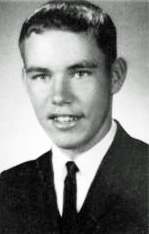 Reid Ernest Grayson, Jr. He was a casualty of the Vietnam War on December 28, 1968. He is honored and remembered by the people of Montana, and by me.
Reid Ernest Grayson, Jr. He was a casualty of the Vietnam War on December 28, 1968. He is honored and remembered by the people of Montana, and by me.
From HonorStates.org:
ORIGINS and HISTORY
Reid Ernest Grayson Jr was born on May 5, 1948. According to our records Montana was his home or enlistment state. Furthermore, we have Scobey listed as the city and Daniels County included within the archival record.
SERVICE DETAILS
He was drafted into the Army. Entered via Selective Service. Served during the Vietnam War. He began his tour on December 13, 1968. He had the rank of Private First Class. Occupation or specialty was Radio Teletypewriter Operator. Service number was 56639052. Served with 25th Infantry Division, 50th Infantry LRRP, Company F.
CASUALTY CIRCUMSTANCES
Grayson experienced a traumatic event which resulted in loss of life on December 28, 1968. Recorded circumstances attributed to: “Died through hostile action, small arms fire”. Incident location: South Vietnam, Binh Duong province.
REMEMBERED and MEMORIALS
Reid is honored on the Vietnam Veteran’s Memorial in Washington DC. Name inscribed at VVM Wall, Panel 36w, Line 84.
AWARDS and COMMENDATIONS
Listed below are some of the awards, medals and commendations that Reid Ernest Grayson Jr either received or may have been qualified for.
★ Purple Heart
★ Combat Infantryman Badge
★ National Defense Service Medal
★ Vietnam Campaign Medal
★ Vietnam Service Medal
★ Distinguished Unit Citation
★ Vietnam Gallantry Cross Unit Citation
★ Good Conduct Medal
I am honored to have known him as a friend when we met in Radio Teletype School at The United States Army Southeastern Signal School (USASESS) at Ft. Gordon, Georgia, in August of 1968. We used to run around together in his old 1958 Chevy with bad wipers. We talked, we traded stories about our childhood, we laughed a lot, we graduated together, and we had many beers together. After graduation, he received orders for Vietnam, and I remained at Ft. Gordon, first as an instructor at the Signal School, then as an Operations Sergeant at our old training company.
We lost touch, and I was not aware that he had been killed just after Christmas of 1968, when I was home celebrating Christmas with my family. I was also not aware that he was a member of the 25th Infantry Division in Cu Chi, Republic of Vietnam where, two years later, I was assigned.
Rest in Peace, Reid. I will never forget.



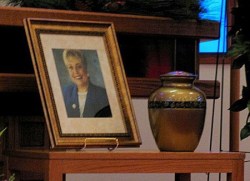 When my wife died in late 2010, and after taking care of all the legal matters, paying the bills, arranging for her cremation, notifying Social Security, trying to exist through Thanksgiving and her memorial service that provided closure for almost everyone but me, and barely tolerating the loneliness and heartache through the Christmas and New Year holidays, the reality of her death and my new and different life crashed down upon me…and the weight was staggering.
When my wife died in late 2010, and after taking care of all the legal matters, paying the bills, arranging for her cremation, notifying Social Security, trying to exist through Thanksgiving and her memorial service that provided closure for almost everyone but me, and barely tolerating the loneliness and heartache through the Christmas and New Year holidays, the reality of her death and my new and different life crashed down upon me…and the weight was staggering. grocery shopping, maybe fill up the gas tank on the car or truck and pick up my meds from the pharmacy. I hated leaving the safety of my house. I felt raw, as though people could tell by looking at me that I was only half of what I used to be. I wanted to be invisible so people couldn’t and wouldn’t see me because I thought they could see the jagged hole in my chest where my heart and soul were ripped from me. I felt vulnerable. I felt that people would look into my eyes and see the sad eyes bloodshot from crying and wonder what my problem was or think I was a wuss or some sort of weakling for not manning-up to my problems and carrying on.
grocery shopping, maybe fill up the gas tank on the car or truck and pick up my meds from the pharmacy. I hated leaving the safety of my house. I felt raw, as though people could tell by looking at me that I was only half of what I used to be. I wanted to be invisible so people couldn’t and wouldn’t see me because I thought they could see the jagged hole in my chest where my heart and soul were ripped from me. I felt vulnerable. I felt that people would look into my eyes and see the sad eyes bloodshot from crying and wonder what my problem was or think I was a wuss or some sort of weakling for not manning-up to my problems and carrying on.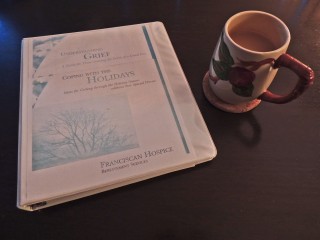 The burden began to lighten somewhat when I began attending my bereavement group sessions. They started in February, a little over nine weeks after Lou died, and it helped immensely to be among others who were experiencing the same emotions as I, especially since two other men were in the group. I was not the lone male. Because the bereavement group sessions were once a week for two hours, I used that day, Tuesday, to run my errands. I drew strength from the group, and they helped to make it easier to face other people, and for me to “fake-it-until-you-make-it.” Though I still felt as though I was missing my soul, I began to simply smile at people in the store. I didn’t have to talk with them, I could simply smile at them. Most of them smiled back at me, especially innocent children. They couldn’t tell I was trying to cope with the loss of my wife. They couldn’t see the hole through me because my smile drew the attention away from it. It helped me hold up long enough in public to not have a personal melt-down. Baby steps, but steps none-the-less.
The burden began to lighten somewhat when I began attending my bereavement group sessions. They started in February, a little over nine weeks after Lou died, and it helped immensely to be among others who were experiencing the same emotions as I, especially since two other men were in the group. I was not the lone male. Because the bereavement group sessions were once a week for two hours, I used that day, Tuesday, to run my errands. I drew strength from the group, and they helped to make it easier to face other people, and for me to “fake-it-until-you-make-it.” Though I still felt as though I was missing my soul, I began to simply smile at people in the store. I didn’t have to talk with them, I could simply smile at them. Most of them smiled back at me, especially innocent children. They couldn’t tell I was trying to cope with the loss of my wife. They couldn’t see the hole through me because my smile drew the attention away from it. It helped me hold up long enough in public to not have a personal melt-down. Baby steps, but steps none-the-less. to face the world alone after only eight weeks, so we continued to meet. For two weeks we met in a basement conference room of the St. Francis Hospital, then for two more weeks in the nearby Federal Way Library, but we couldn’t take food or drink there, so we decided to meet in a small restaurant for brunch. By that time, eight of us remained of the original twelve in the bereavement group. After twelve weeks, we were now meeting in public. One more small step.
to face the world alone after only eight weeks, so we continued to meet. For two weeks we met in a basement conference room of the St. Francis Hospital, then for two more weeks in the nearby Federal Way Library, but we couldn’t take food or drink there, so we decided to meet in a small restaurant for brunch. By that time, eight of us remained of the original twelve in the bereavement group. After twelve weeks, we were now meeting in public. One more small step. I was on the road for two weeks, making stops in Paradise, California South Lake Tahoe, California/Stateline, Nevada, through the Gold Country to San Jose, visiting with my niece and her family, my nephew and his family, and then my sister-in-law (Lou’s sister) and her family. We took side trips to Carmel and Monterey, and then I drove home. I drove 2,000 miles and took 1,400 photos on that trip. By the time I returned home, I felt like a new man, my own person, and at ease with myself. I had become confident in myself again. I didn’t have to force myself to smile at or talk to people…total strangers…anymore. My friends welcomed me back. Though I was alone, I no longer felt lonely. I no longer ached for Lou, though I missed her. I was happy for her because she was no longer in pain, and I was happy for me for the same reason!
I was on the road for two weeks, making stops in Paradise, California South Lake Tahoe, California/Stateline, Nevada, through the Gold Country to San Jose, visiting with my niece and her family, my nephew and his family, and then my sister-in-law (Lou’s sister) and her family. We took side trips to Carmel and Monterey, and then I drove home. I drove 2,000 miles and took 1,400 photos on that trip. By the time I returned home, I felt like a new man, my own person, and at ease with myself. I had become confident in myself again. I didn’t have to force myself to smile at or talk to people…total strangers…anymore. My friends welcomed me back. Though I was alone, I no longer felt lonely. I no longer ached for Lou, though I missed her. I was happy for her because she was no longer in pain, and I was happy for me for the same reason! National Park because I’d never been there. I entered the park and decided to drive the Going to the Sun Road to Logan Pass, then continued east down to Sunrise, across the highway from St. Mary Lake. I stopped for dinner there, and on a whim, inquired about lodging at the hotel there. All their rooms were full, but the young man at the front desk checked the park’s hotels via the internet and found a vacancy at the Lake McDonald Lodge, either by good fortune or perhaps Lou had something to do with it? Regardless, I took it! I paid for it at Sunrise and then drove back across the Going to the Sun Road to Lake McDonald. When I checked in at the lodge, I found my room was in one of the Lake McDonald Lodge cabins facing the lake. It was a very good day.
National Park because I’d never been there. I entered the park and decided to drive the Going to the Sun Road to Logan Pass, then continued east down to Sunrise, across the highway from St. Mary Lake. I stopped for dinner there, and on a whim, inquired about lodging at the hotel there. All their rooms were full, but the young man at the front desk checked the park’s hotels via the internet and found a vacancy at the Lake McDonald Lodge, either by good fortune or perhaps Lou had something to do with it? Regardless, I took it! I paid for it at Sunrise and then drove back across the Going to the Sun Road to Lake McDonald. When I checked in at the lodge, I found my room was in one of the Lake McDonald Lodge cabins facing the lake. It was a very good day. The next day I had breakfast at the lodge, checked out, and decided to hike up to Avalanche Lake, then back down to Avalanche Creek before driving to and walking around Apgar Village. From there, I drove back to Lakeside on Flathead Lake. It took another week for me to get back home from there because I spent a couple of more days at Lakeside driving and hiking around the hills above Flathead Lake, then stopping in Coeur D’Alene to drive down the east side of Lake Coeur D’Alene. After entering Washington, I stopped in Moses Lake before finally driving home. Once again, I had been to places I’d never been to see things I’d never seen, and all because I wanted to. This time it was a 1,400-mile road trip with another 1,400 photos taken. I finally felt complete again.
The next day I had breakfast at the lodge, checked out, and decided to hike up to Avalanche Lake, then back down to Avalanche Creek before driving to and walking around Apgar Village. From there, I drove back to Lakeside on Flathead Lake. It took another week for me to get back home from there because I spent a couple of more days at Lakeside driving and hiking around the hills above Flathead Lake, then stopping in Coeur D’Alene to drive down the east side of Lake Coeur D’Alene. After entering Washington, I stopped in Moses Lake before finally driving home. Once again, I had been to places I’d never been to see things I’d never seen, and all because I wanted to. This time it was a 1,400-mile road trip with another 1,400 photos taken. I finally felt complete again.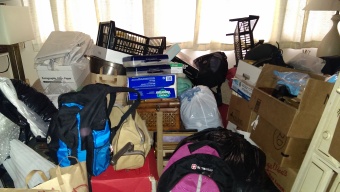 giving her things away, by not holding them sacred. But what would I do with them? I couldn’t use them. They’d be going to waste, they’d be a constant reminder of what was and would never be again. I didn’t want to carry that the rest of my life. I began small, with her clothes, the clothes she loved, the clothes I remembered. It took some time, but after they were gone, I could still remember her in them, how she looked. The clothes were gone, but not the memories. The clothes didn’t make those memories, her stuff didn’t make those memories, we did and I didn’t lose them. It was reassuring, and that made going forward easier. It made giving up my own things easier, too. If I hadn’t used them or worn them in several months, they went.
giving her things away, by not holding them sacred. But what would I do with them? I couldn’t use them. They’d be going to waste, they’d be a constant reminder of what was and would never be again. I didn’t want to carry that the rest of my life. I began small, with her clothes, the clothes she loved, the clothes I remembered. It took some time, but after they were gone, I could still remember her in them, how she looked. The clothes were gone, but not the memories. The clothes didn’t make those memories, her stuff didn’t make those memories, we did and I didn’t lose them. It was reassuring, and that made going forward easier. It made giving up my own things easier, too. If I hadn’t used them or worn them in several months, they went. The following day, Monday, after three weeks of corresponding by email, I asked Debbie if she would meet me for coffee in a safe and public place. I wasn’t sure if she would accept, but she did! It began as coffee (and tea for her) at 11:00 a.m. on Wednesday, turned into dinner at 7:00 p.m. two doors down, and then the restaurant was closing too soon. We spent the following Saturday together hiking around Paradise at Mt. Rainier photographing the scenery, followed by dinner at a small restaurant just outside the park entrance, and it closed too soon, also. We met for dinner the following Monday, and by Wednesday we decided that we were a couple.
The following day, Monday, after three weeks of corresponding by email, I asked Debbie if she would meet me for coffee in a safe and public place. I wasn’t sure if she would accept, but she did! It began as coffee (and tea for her) at 11:00 a.m. on Wednesday, turned into dinner at 7:00 p.m. two doors down, and then the restaurant was closing too soon. We spent the following Saturday together hiking around Paradise at Mt. Rainier photographing the scenery, followed by dinner at a small restaurant just outside the park entrance, and it closed too soon, also. We met for dinner the following Monday, and by Wednesday we decided that we were a couple. stop carrying the grief and the accompanying guilt with me without losing my memories of Lou and our twenty-eight years together. It sure didn’t hurt to have Debbie accept my invitation to meet for coffee, either!
stop carrying the grief and the accompanying guilt with me without losing my memories of Lou and our twenty-eight years together. It sure didn’t hurt to have Debbie accept my invitation to meet for coffee, either!
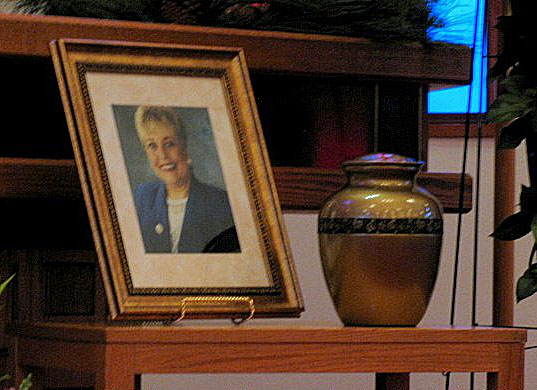 It didn’t happen all at once. After she died, I was in shock. I went through the motions of arranging for her cremation, writing her obituary, writing a eulogy that I would read at her memorial service, taking care of all the legal matters, being around when the hospice people showed up to remove the hospital bed and the oxygen machine, and preparing for the memorial service. The pain, the loneliness, and the emptiness was building throughout all the preparations, right up to the memorial service. It was a wonderful service and there were over two hundred who came to pay their respects and show their support. And then it was over. That memorial service provided closure for everyone…but not for me, and to a lesser extent, not for our sons. After the memorial service, everyone went home and went on with life, even the boys because they had families and jobs to return to. I went home to an empty house, and my life stood still. The pain, the loneliness, the emptiness began to hit me like an avalanche. It buried me. It was worse than the movie Groundhog Day, reliving an empty life day after day…after day. I began to pray every night I would die in my sleep to end it.
It didn’t happen all at once. After she died, I was in shock. I went through the motions of arranging for her cremation, writing her obituary, writing a eulogy that I would read at her memorial service, taking care of all the legal matters, being around when the hospice people showed up to remove the hospital bed and the oxygen machine, and preparing for the memorial service. The pain, the loneliness, and the emptiness was building throughout all the preparations, right up to the memorial service. It was a wonderful service and there were over two hundred who came to pay their respects and show their support. And then it was over. That memorial service provided closure for everyone…but not for me, and to a lesser extent, not for our sons. After the memorial service, everyone went home and went on with life, even the boys because they had families and jobs to return to. I went home to an empty house, and my life stood still. The pain, the loneliness, the emptiness began to hit me like an avalanche. It buried me. It was worse than the movie Groundhog Day, reliving an empty life day after day…after day. I began to pray every night I would die in my sleep to end it.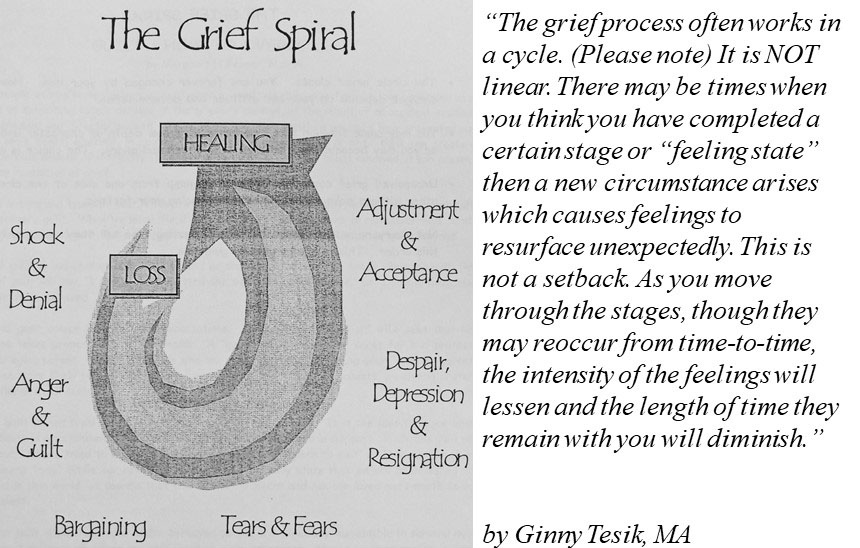 I had tried to cope with her loss by myself and found all I wanted to do was die to end the continuous pain and loneliness. I could have fought anything else, but I couldn’t fight my feelings, I couldn’t fight my grief. I found little respite in anything, except my worst moments when I was on my knees in the hall, not being able to breathe because I was weeping uncontrollably. I would beg God to help me, and He did…every time…several times a day. It didn’t last, so I had to do something. It took just a bit over two weeks after her memorial service that I called and reserved my place in that group session. Though I was relieved I called, I was ashamed I couldn’t carry this burden by myself…after all, I had prayed for God to take her home and that I would take on her pain. I didn’t realize that the weight of my own pain combined with hers was too heavy for me to carry alone.
I had tried to cope with her loss by myself and found all I wanted to do was die to end the continuous pain and loneliness. I could have fought anything else, but I couldn’t fight my feelings, I couldn’t fight my grief. I found little respite in anything, except my worst moments when I was on my knees in the hall, not being able to breathe because I was weeping uncontrollably. I would beg God to help me, and He did…every time…several times a day. It didn’t last, so I had to do something. It took just a bit over two weeks after her memorial service that I called and reserved my place in that group session. Though I was relieved I called, I was ashamed I couldn’t carry this burden by myself…after all, I had prayed for God to take her home and that I would take on her pain. I didn’t realize that the weight of my own pain combined with hers was too heavy for me to carry alone. I awaited the day the sessions would begin…February 1, 2011…with both hope and some reticence. I wondered if I would be the only male there. I told myself I could always attend the first session and simply not return for the rest of them if I felt ‘funny’ about it. It gave me something different to look forward to than just another day of the same grief. I felt this way even on the morning of that first session. I continued to debate whether I would attend as I had my first cup of coffee, took my shower, dressed, fixed and ate my breakfast and had my second cup of coffee. And then I went. After seeing two other men there, I decided to stay. I found it comforting to know others felt as I did. We all found it comforting to know we were among other who understood us.
I awaited the day the sessions would begin…February 1, 2011…with both hope and some reticence. I wondered if I would be the only male there. I told myself I could always attend the first session and simply not return for the rest of them if I felt ‘funny’ about it. It gave me something different to look forward to than just another day of the same grief. I felt this way even on the morning of that first session. I continued to debate whether I would attend as I had my first cup of coffee, took my shower, dressed, fixed and ate my breakfast and had my second cup of coffee. And then I went. After seeing two other men there, I decided to stay. I found it comforting to know others felt as I did. We all found it comforting to know we were among other who understood us. Eight weeks after our sessions began, they ended. We all were not ready, so we all decided that we would continue to meet at the same time on the same day every week. After a month of meeting in two different places, we settled on a little restaurant and eight of continued to meet and have brunch together. After seven years and nine months, four of us are still meeting for brunch every Tuesday at 11:00 a.m. We now call ourselves a “friendship group,” but we’re more like family now…another gift.
Eight weeks after our sessions began, they ended. We all were not ready, so we all decided that we would continue to meet at the same time on the same day every week. After a month of meeting in two different places, we settled on a little restaurant and eight of continued to meet and have brunch together. After seven years and nine months, four of us are still meeting for brunch every Tuesday at 11:00 a.m. We now call ourselves a “friendship group,” but we’re more like family now…another gift.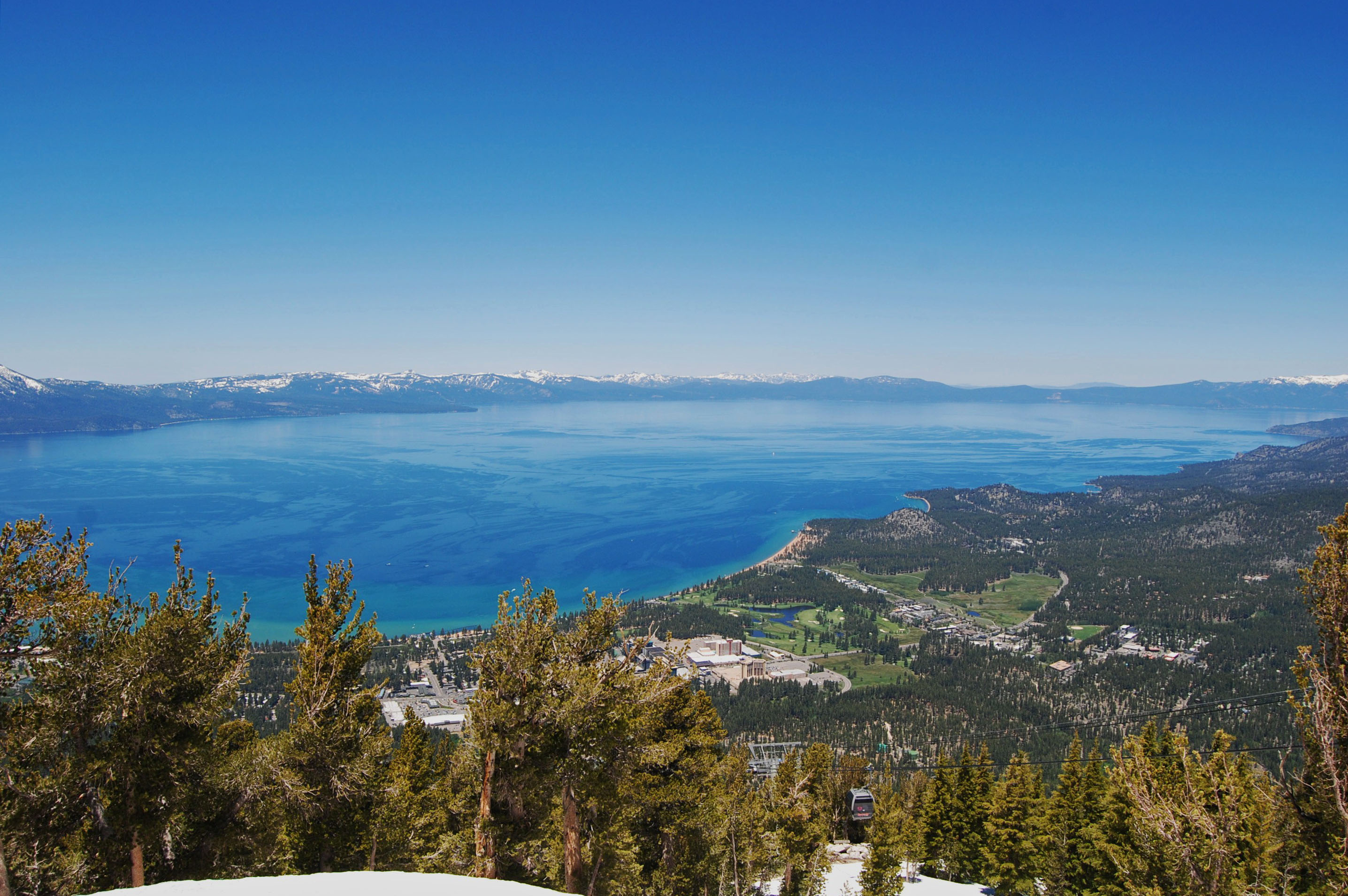 That first day on the road was the most difficult. It was the first road trip in twenty-eight years that Lou wasn’t with me. I cried the first time I saw a beautiful rainbow and turned to comment and saw the vacant seat next me. I wept for almost fifty miles. But that day ended with a beautiful sunset and a classic car show in Medford, Oregon. It only got better from there. I drove through Chico to Paradise, CA to visit my niece and her family, then to South Lake Tahoe, CA to visit my nephew and his family. I even took the tram up to Heavenly Valley and got to see most of Lake Tahoe. From there, I went to San Jose to visit my sister-in-law and her family and took side trips to Carmel and Monterey. Two weeks and about 2,000 miles later, I was home and I felt like a new person. I no longer felt as though I was missing half of me. I had discovered my whole self again! That was a gift within itself. Yet, another gift I received was the realization that even in discovering my whole self again, I didn’t forget Lou. I would always have the memories of her, our life together, what she taught me and what we learned together in our twenty-eight years.
That first day on the road was the most difficult. It was the first road trip in twenty-eight years that Lou wasn’t with me. I cried the first time I saw a beautiful rainbow and turned to comment and saw the vacant seat next me. I wept for almost fifty miles. But that day ended with a beautiful sunset and a classic car show in Medford, Oregon. It only got better from there. I drove through Chico to Paradise, CA to visit my niece and her family, then to South Lake Tahoe, CA to visit my nephew and his family. I even took the tram up to Heavenly Valley and got to see most of Lake Tahoe. From there, I went to San Jose to visit my sister-in-law and her family and took side trips to Carmel and Monterey. Two weeks and about 2,000 miles later, I was home and I felt like a new person. I no longer felt as though I was missing half of me. I had discovered my whole self again! That was a gift within itself. Yet, another gift I received was the realization that even in discovering my whole self again, I didn’t forget Lou. I would always have the memories of her, our life together, what she taught me and what we learned together in our twenty-eight years. Two weeks later, I went on my second road trip. This time it was to her family reunion at Flathead Lake in Montana. I had doubts about going to her family reunion, but was welcomed with open arms and told that, though I was an “outlaw” (married into the family), I would always be part of the family and they wouldn’t let me out. That’s how families grow, they said, and no matter if I found someone else and remarried, she would also become part of the family, too. I love this family. I love my family.
Two weeks later, I went on my second road trip. This time it was to her family reunion at Flathead Lake in Montana. I had doubts about going to her family reunion, but was welcomed with open arms and told that, though I was an “outlaw” (married into the family), I would always be part of the family and they wouldn’t let me out. That’s how families grow, they said, and no matter if I found someone else and remarried, she would also become part of the family, too. I love this family. I love my family. Since I had driven directly to Lakeside, Montana for the family reunion, I decided I was going to do some sight-seeing and exploring of the area. I wandered the hills to the west of the lake, then decided…on a whim…to visit Glacier Park. I drove to Glacier Park, drove the Going to the Sun Road to Rising Sun on Ste. Marys Lake and back, lucked out and got a room at the Lake McDonald Lodge on a cancellation. Another gift. I hiked up Avalanche Creek to Avalanche Lake. I drove to Apgar Village and explored the area. I returned to Lakeside for three more days so I could drive and hike the hills above Flathead Lake. On the way home, I drove around the north and east side of Lake Coeur D’Alene and stayed in Coeur D’Alene. I stopped above the Columbia River just before Vantage to really look at part of the Columbia River Gorge before I drove home. I took over 1,400 photographs on my road trip, about one photograph for every mile I drove. I was refreshed. I felt new and confident. I felt grateful I was alive. I also felt as though I would never be alone because I had my memories, and I had God with me always.
Since I had driven directly to Lakeside, Montana for the family reunion, I decided I was going to do some sight-seeing and exploring of the area. I wandered the hills to the west of the lake, then decided…on a whim…to visit Glacier Park. I drove to Glacier Park, drove the Going to the Sun Road to Rising Sun on Ste. Marys Lake and back, lucked out and got a room at the Lake McDonald Lodge on a cancellation. Another gift. I hiked up Avalanche Creek to Avalanche Lake. I drove to Apgar Village and explored the area. I returned to Lakeside for three more days so I could drive and hike the hills above Flathead Lake. On the way home, I drove around the north and east side of Lake Coeur D’Alene and stayed in Coeur D’Alene. I stopped above the Columbia River just before Vantage to really look at part of the Columbia River Gorge before I drove home. I took over 1,400 photographs on my road trip, about one photograph for every mile I drove. I was refreshed. I felt new and confident. I felt grateful I was alive. I also felt as though I would never be alone because I had my memories, and I had God with me always. A month after I returned home, just three days after what would have been Lou’s and my twenty-ninth wedding anniversary and about nine months after Lou passed away, I met Debbie. She and I had been corresponding by email for three weeks after we ‘met’ on the last dating site I was still on. We liked how the other wrote…straightforward, descriptive, and about family…and after three weeks, she consented to meet me for coffee (and tea) 😉. What began with some trepidation on a Wednesday at 11:00 a.m. at the Sumner, WA Starbucks, turned out to last beyond coffee and tea. Since each thought the other lived up to the way we wrote and described ourselves, and because we enjoyed each other’s company, it turned into dinner at Farrelli’s two doors down. That led to an outing to Paradise at Mt. Rainer for some hiking and photographing the sites the following Saturday, dinner again on the following Monday, and a day together Wednesday…and we decided that we wanted a relationship.
A month after I returned home, just three days after what would have been Lou’s and my twenty-ninth wedding anniversary and about nine months after Lou passed away, I met Debbie. She and I had been corresponding by email for three weeks after we ‘met’ on the last dating site I was still on. We liked how the other wrote…straightforward, descriptive, and about family…and after three weeks, she consented to meet me for coffee (and tea) 😉. What began with some trepidation on a Wednesday at 11:00 a.m. at the Sumner, WA Starbucks, turned out to last beyond coffee and tea. Since each thought the other lived up to the way we wrote and described ourselves, and because we enjoyed each other’s company, it turned into dinner at Farrelli’s two doors down. That led to an outing to Paradise at Mt. Rainer for some hiking and photographing the sites the following Saturday, dinner again on the following Monday, and a day together Wednesday…and we decided that we wanted a relationship.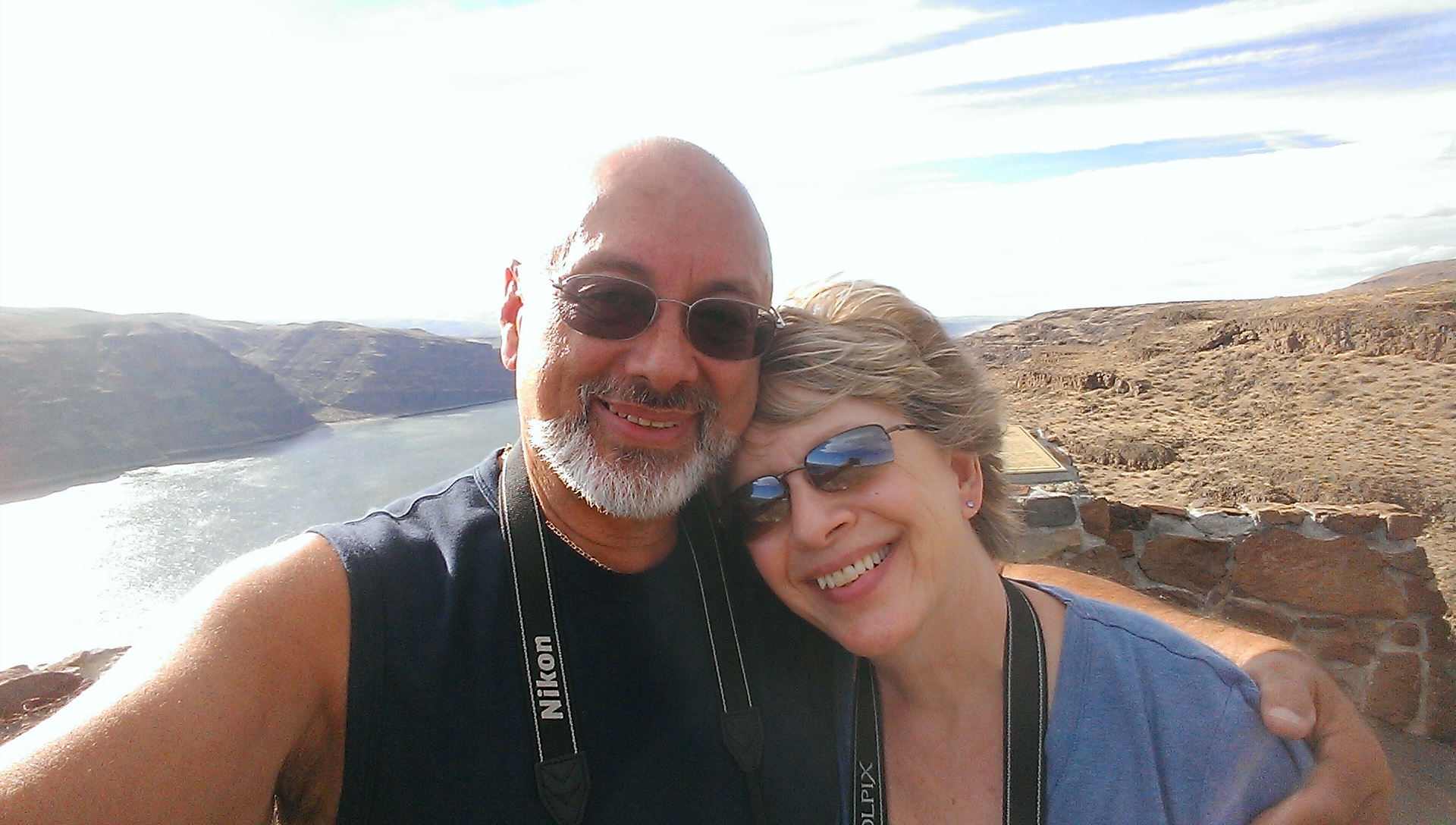 So here I am today, exactly eight years later, living a new, different, and wonderfully loving life. I am thankful that Lou is not in pain and is whole again in a different place. I am thankful and blessed for the gift of a new life for me, and all the gifts I have received along the way, but especially for my Debbie. I never thought I would love again, but I am! Every night now, when we turn off the lights to go to sleep, we hold hands for a while, and I give thanks to God that I got to spend the gift of that day with Debbie and, if it is His Will, I will awaken to the gift of a brand-new day that I will get to share my love with her again! I couldn’t have done it without Him.
So here I am today, exactly eight years later, living a new, different, and wonderfully loving life. I am thankful that Lou is not in pain and is whole again in a different place. I am thankful and blessed for the gift of a new life for me, and all the gifts I have received along the way, but especially for my Debbie. I never thought I would love again, but I am! Every night now, when we turn off the lights to go to sleep, we hold hands for a while, and I give thanks to God that I got to spend the gift of that day with Debbie and, if it is His Will, I will awaken to the gift of a brand-new day that I will get to share my love with her again! I couldn’t have done it without Him.
 green late spring when the deciduous trees sprout their lighter, brighter green leaves and the flowers begin to bloom again.
green late spring when the deciduous trees sprout their lighter, brighter green leaves and the flowers begin to bloom again.

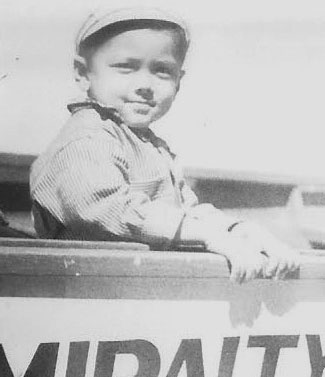 As a child, I was happy, friendly, curious, adventurous, and even-tempered. I had no reason to be afraid of very much because my world was full of love, gentleness, fun, and a developing sense of adventure. One of my first real memories, however, involved music. My mother was a classical pianist, and I was brought up on Rachmaninoff, Bach, Beethoven, and Debussy. When my dad was working, building his fishing resort, mom and I would be home. She would fix me breakfast, tidy up the house and I would help her, and she’d play with me for a while before she’d sit down at the piano, a beautiful little spinet, and play.
As a child, I was happy, friendly, curious, adventurous, and even-tempered. I had no reason to be afraid of very much because my world was full of love, gentleness, fun, and a developing sense of adventure. One of my first real memories, however, involved music. My mother was a classical pianist, and I was brought up on Rachmaninoff, Bach, Beethoven, and Debussy. When my dad was working, building his fishing resort, mom and I would be home. She would fix me breakfast, tidy up the house and I would help her, and she’d play with me for a while before she’d sit down at the piano, a beautiful little spinet, and play. One day, for some unknown reason, I dragged a cushion off the couch, placed it at the end of the piano, and sat on it to listen to her. I leaned back on the side of the piano and suddenly, I could not only hear what she played, I could feel the music and the emotion through the wood, through the back of my head to my teeth, and through my back all the way to my breastbone. It felt as though I was part of the music…and I was hooked. I was three years old. To this day, sixty-eight years later, I can still lose myself in music, even when I sing and play my guitar at home, or in church with our praise team. This is one of the good experiences that has changed my life and helped me cope with life’s twists and turns as I got older.
One day, for some unknown reason, I dragged a cushion off the couch, placed it at the end of the piano, and sat on it to listen to her. I leaned back on the side of the piano and suddenly, I could not only hear what she played, I could feel the music and the emotion through the wood, through the back of my head to my teeth, and through my back all the way to my breastbone. It felt as though I was part of the music…and I was hooked. I was three years old. To this day, sixty-eight years later, I can still lose myself in music, even when I sing and play my guitar at home, or in church with our praise team. This is one of the good experiences that has changed my life and helped me cope with life’s twists and turns as I got older. While in the Army, I saw and did a lot of things that can’t be unseen or undone no matter how hard I tried, especially in Vietnam. One thing that cut me to the heart, though, was when I watched a young Army Private die in my hospital room from burns that covered 95% of his body after our charter plane crashed on take-off in Anchorage, Alaska after a refueling stop. I had met him just a few hours earlier. He was a nice, polite young man and it was the first time he’d ever been away from his home in Houston, Texas, except for Basic Training and Advanced Infantry Training at Ft. Bliss. We were on our way to Vietnam, and I was going back for my second tour and to reenlist once I got back there. I had protected him from three other soldiers who were bullying him in the McChord Air Force Base Terminal just prior to take-off. We ended up sitting in the same row during the flight to Anchorage, so we chatted. I marveled at his innocence, his naivete, and his love for his family. He made me wonder where and when my innocence left me. I was twenty-two. He had just turned nineteen when I watched him take his last breath. Even under heavy anesthesia, I watched as a doctor and nurses tried to revive him, tried to give him an emergency tracheotomy, and finally stopped and hung their heads. I heard the doctor say, “He’s gone,” just before I faded out. When I awoke, his bed was vacant, freshly made. He still had some innocence left, he was a nice guy, and it left me sad, angry and confused that he should die instead of me. Of the two hundred thirty-nine military and dependents aboard that plane, forty-seven died in the crash. Forty-five were military. He was the last to die. I was haunted by that for forty years.
While in the Army, I saw and did a lot of things that can’t be unseen or undone no matter how hard I tried, especially in Vietnam. One thing that cut me to the heart, though, was when I watched a young Army Private die in my hospital room from burns that covered 95% of his body after our charter plane crashed on take-off in Anchorage, Alaska after a refueling stop. I had met him just a few hours earlier. He was a nice, polite young man and it was the first time he’d ever been away from his home in Houston, Texas, except for Basic Training and Advanced Infantry Training at Ft. Bliss. We were on our way to Vietnam, and I was going back for my second tour and to reenlist once I got back there. I had protected him from three other soldiers who were bullying him in the McChord Air Force Base Terminal just prior to take-off. We ended up sitting in the same row during the flight to Anchorage, so we chatted. I marveled at his innocence, his naivete, and his love for his family. He made me wonder where and when my innocence left me. I was twenty-two. He had just turned nineteen when I watched him take his last breath. Even under heavy anesthesia, I watched as a doctor and nurses tried to revive him, tried to give him an emergency tracheotomy, and finally stopped and hung their heads. I heard the doctor say, “He’s gone,” just before I faded out. When I awoke, his bed was vacant, freshly made. He still had some innocence left, he was a nice guy, and it left me sad, angry and confused that he should die instead of me. Of the two hundred thirty-nine military and dependents aboard that plane, forty-seven died in the crash. Forty-five were military. He was the last to die. I was haunted by that for forty years. sit silently, with clenched teeth and tears running down their faces from the pain as dead, charred skin was removed, as bandages were being changed, from scrubbing their own eschar from their burns because it hurt just a little less than if someone else did it. I began realize how special my fellow patients were. There were very few who felt sorry for themselves. Over half of them had more injuries and were burned worse than I. They wanted no special treatment above what anyone else had, no matter what rank they held or how badly they were hurt. They wanted to be looked at and treated like normal people instead of burn victims. They worked hard at their physical therapy to regain strength and flexibility. It was slow and painful, and I saw a lot of tears roll down burned faces, but nobody cried out, and no one complained. I respected them immensely. I admired them. I understood them, I empathized with them, and being with them, healing with them, changed me forever in both positive and negative ways.
sit silently, with clenched teeth and tears running down their faces from the pain as dead, charred skin was removed, as bandages were being changed, from scrubbing their own eschar from their burns because it hurt just a little less than if someone else did it. I began realize how special my fellow patients were. There were very few who felt sorry for themselves. Over half of them had more injuries and were burned worse than I. They wanted no special treatment above what anyone else had, no matter what rank they held or how badly they were hurt. They wanted to be looked at and treated like normal people instead of burn victims. They worked hard at their physical therapy to regain strength and flexibility. It was slow and painful, and I saw a lot of tears roll down burned faces, but nobody cried out, and no one complained. I respected them immensely. I admired them. I understood them, I empathized with them, and being with them, healing with them, changed me forever in both positive and negative ways.
 After my wife died, I became one of those weaklings that I had become intolerant of. For the first time in decades, I cried. I wept. My heart ached, I wanted to give up and die because I could not handle my emotions. It would have been easier had I shut down like I did when my first fiancée died and I joined the Army. Yes, I did have other relationships afterward, but when I felt that I was getting too close and could get hurt, I’d distance myself a bit and then tell whoever I was with, “Well, I guess I’d best be movin’ right along,” and then I’d leave. It took a long time to recover my feelings, and it was difficult feel vulnerable again, but I did it. I had to if I wanted to have any kind of a meaningful relationship, if I really wanted to fall in love with someone. And I did!
After my wife died, I became one of those weaklings that I had become intolerant of. For the first time in decades, I cried. I wept. My heart ached, I wanted to give up and die because I could not handle my emotions. It would have been easier had I shut down like I did when my first fiancée died and I joined the Army. Yes, I did have other relationships afterward, but when I felt that I was getting too close and could get hurt, I’d distance myself a bit and then tell whoever I was with, “Well, I guess I’d best be movin’ right along,” and then I’d leave. It took a long time to recover my feelings, and it was difficult feel vulnerable again, but I did it. I had to if I wanted to have any kind of a meaningful relationship, if I really wanted to fall in love with someone. And I did! I also believe that the amount of grief one feels is directly proportional to how much he or she loved. Grief is the price of Love. I was beginning to understand, and I was grateful for that. With the understanding, came the empathy, being able to understand what others were going through when they lost a spouse or loved one. It’s difficult enough to lose family members, especially one’s own children because they are the flesh and blood of a union between a husband and wife who chose to love each other, and that is what makes losing a spouse to death so hard. A spouse is not family until he or she is chosen by the other to love and cherish, and they choose you back. Once I learned all this, I wanted to pay it forward, to give what I learned to those who need it, to those who want it. I will always be a work-in-progress. Someday, I hope to be the person God wants me to be. This is what I hope.
I also believe that the amount of grief one feels is directly proportional to how much he or she loved. Grief is the price of Love. I was beginning to understand, and I was grateful for that. With the understanding, came the empathy, being able to understand what others were going through when they lost a spouse or loved one. It’s difficult enough to lose family members, especially one’s own children because they are the flesh and blood of a union between a husband and wife who chose to love each other, and that is what makes losing a spouse to death so hard. A spouse is not family until he or she is chosen by the other to love and cherish, and they choose you back. Once I learned all this, I wanted to pay it forward, to give what I learned to those who need it, to those who want it. I will always be a work-in-progress. Someday, I hope to be the person God wants me to be. This is what I hope. Oh! And yes, though I experienced such crushing grief, not shutting down emotionally turned out to be a most wonderful thing! I have found love again, with my Debbie.
Oh! And yes, though I experienced such crushing grief, not shutting down emotionally turned out to be a most wonderful thing! I have found love again, with my Debbie. Regardless, we arrived safely in Anchorage and deplaned while it was being fueled and one of the engines was inspected after the cowling was removed. I suspected it was that far left engine. It was cold and ice covered the runway. I thought I heard we had taken on 69,000 lbs of fuel, but later found out we took on over 117,000 lbs of fuel. When we boarded, once again I boarded late and noticed there were women and children…dependents…on board, possibly going to Yokota, Japan to be with their husbands and fathers. I found a seat in the tail section of the plane, about three or four rows from the back, on the starboard side by the aisle. I noticed that the young soldier I’d met in the McChord terminal was seated in the same row, but across the aisle in the center seat. We nodded a greeting to each other as I took my seat. Though we left the terminal and sped down the runway, the plane never left the ground.
Regardless, we arrived safely in Anchorage and deplaned while it was being fueled and one of the engines was inspected after the cowling was removed. I suspected it was that far left engine. It was cold and ice covered the runway. I thought I heard we had taken on 69,000 lbs of fuel, but later found out we took on over 117,000 lbs of fuel. When we boarded, once again I boarded late and noticed there were women and children…dependents…on board, possibly going to Yokota, Japan to be with their husbands and fathers. I found a seat in the tail section of the plane, about three or four rows from the back, on the starboard side by the aisle. I noticed that the young soldier I’d met in the McChord terminal was seated in the same row, but across the aisle in the center seat. We nodded a greeting to each other as I took my seat. Though we left the terminal and sped down the runway, the plane never left the ground.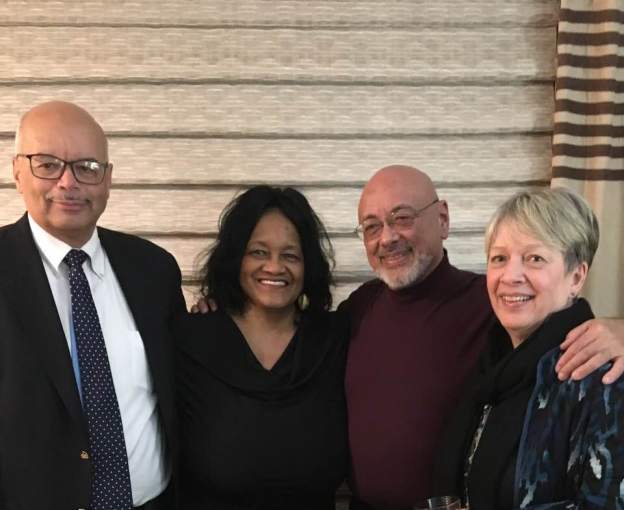
 I love this photo! Debbie and I are the couple on the right, and Jerry and Yvonne are the couple on the left. The real story, however, is the couple in the middle. That’s Yvonne Broady, author of Brave in a New World: A Guide to Grieving the Loss of a Spouse, and me, Bob Ellison, author of The First Snow: A Journal about a Man’s Faith-based Journey through Grief. The occasion is our first face-to-face meeting after knowing each other for three years via long distance through emails, Facebook, and then via Skype (with me in Washington state and Yvonne in New York), as we co-facilitate a grief and comfort group, Matthew 5:4, hosted by the Reverend Debra Northern of The Riverside Church of New York since May 2016.
I love this photo! Debbie and I are the couple on the right, and Jerry and Yvonne are the couple on the left. The real story, however, is the couple in the middle. That’s Yvonne Broady, author of Brave in a New World: A Guide to Grieving the Loss of a Spouse, and me, Bob Ellison, author of The First Snow: A Journal about a Man’s Faith-based Journey through Grief. The occasion is our first face-to-face meeting after knowing each other for three years via long distance through emails, Facebook, and then via Skype (with me in Washington state and Yvonne in New York), as we co-facilitate a grief and comfort group, Matthew 5:4, hosted by the Reverend Debra Northern of The Riverside Church of New York since May 2016.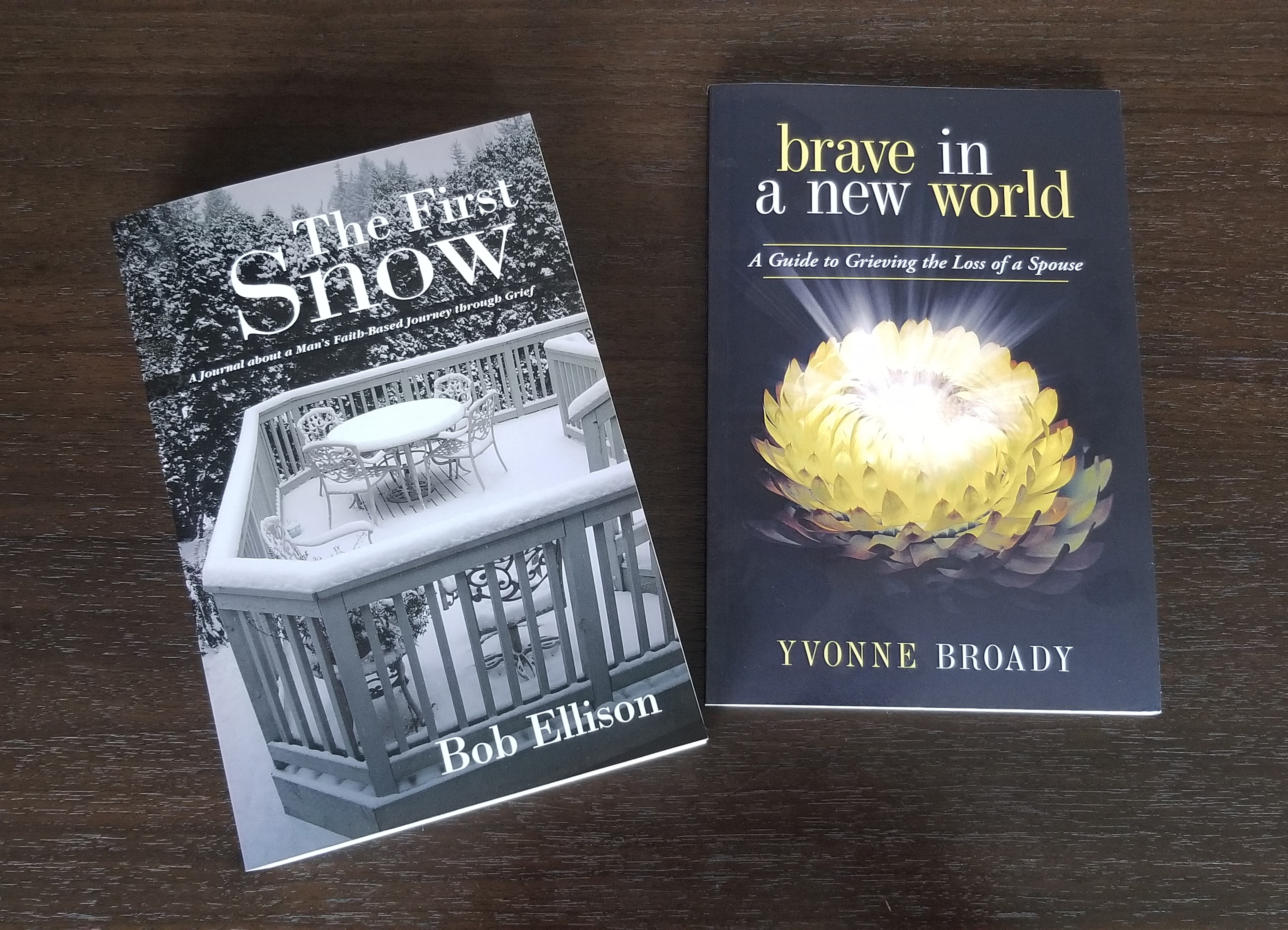
 miles, I had been to places I’d never been before to see things I’d never seen and had taken over 2,500 photographs. I had even played my guitar and sang in an impromptu one-man ‘show’ at a hotel in Cottage Grove, Oregon one evening at the request of the hotel staff, as well as sat alone on the shore of Flathead Lake in Montana one evening and played my guitar and sang to the moon. I missed Lou so much, but I felt whole again and renewed. I also felt that she was with me on my travels, watching me grow and heal emotionally and getting used to being without her. Toward the end of that four-month period, I had begun cleaning out my house. It was nine months since Lou had passed away. During this time, too, Debbie and I were falling in love.
miles, I had been to places I’d never been before to see things I’d never seen and had taken over 2,500 photographs. I had even played my guitar and sang in an impromptu one-man ‘show’ at a hotel in Cottage Grove, Oregon one evening at the request of the hotel staff, as well as sat alone on the shore of Flathead Lake in Montana one evening and played my guitar and sang to the moon. I missed Lou so much, but I felt whole again and renewed. I also felt that she was with me on my travels, watching me grow and heal emotionally and getting used to being without her. Toward the end of that four-month period, I had begun cleaning out my house. It was nine months since Lou had passed away. During this time, too, Debbie and I were falling in love. around, laughter, and disbelief that we were finally meeting face-to-face. Debbie and I got to meet Yvonne’s son and mother, too! It was a most special evening, filled with welcome, with joy, with more laughter, with more hugs, good food, and with love. The time flew by too quickly, but it was so good to be able to finally see everyone in person and see what beautiful people they all are and, at long last, to talk with them all face-to-face. It was such a gift to see them, especially my dear sister, Yvonne, who opened her home and her heart to us.
around, laughter, and disbelief that we were finally meeting face-to-face. Debbie and I got to meet Yvonne’s son and mother, too! It was a most special evening, filled with welcome, with joy, with more laughter, with more hugs, good food, and with love. The time flew by too quickly, but it was so good to be able to finally see everyone in person and see what beautiful people they all are and, at long last, to talk with them all face-to-face. It was such a gift to see them, especially my dear sister, Yvonne, who opened her home and her heart to us. Sunday, we all met for Lunch at The Landmarc Restaurant at the Time-Warner Building on Columbia Circle. It was another special day, sitting in the restaurant and talking around a large, round table, sharing stories, sharing and acknowledging the progress and growth all had realized since their first meeting with the group. The food was good, but the company and camaraderie were even better. All too soon, we said our good-byes and went our separate ways. We would meet again on Tuesday at Cecelia’s home for a dinner and our meeting.
Sunday, we all met for Lunch at The Landmarc Restaurant at the Time-Warner Building on Columbia Circle. It was another special day, sitting in the restaurant and talking around a large, round table, sharing stories, sharing and acknowledging the progress and growth all had realized since their first meeting with the group. The food was good, but the company and camaraderie were even better. All too soon, we said our good-byes and went our separate ways. We would meet again on Tuesday at Cecelia’s home for a dinner and our meeting. On Tuesday afternoon, we met Debra at The Riverside
On Tuesday afternoon, we met Debra at The Riverside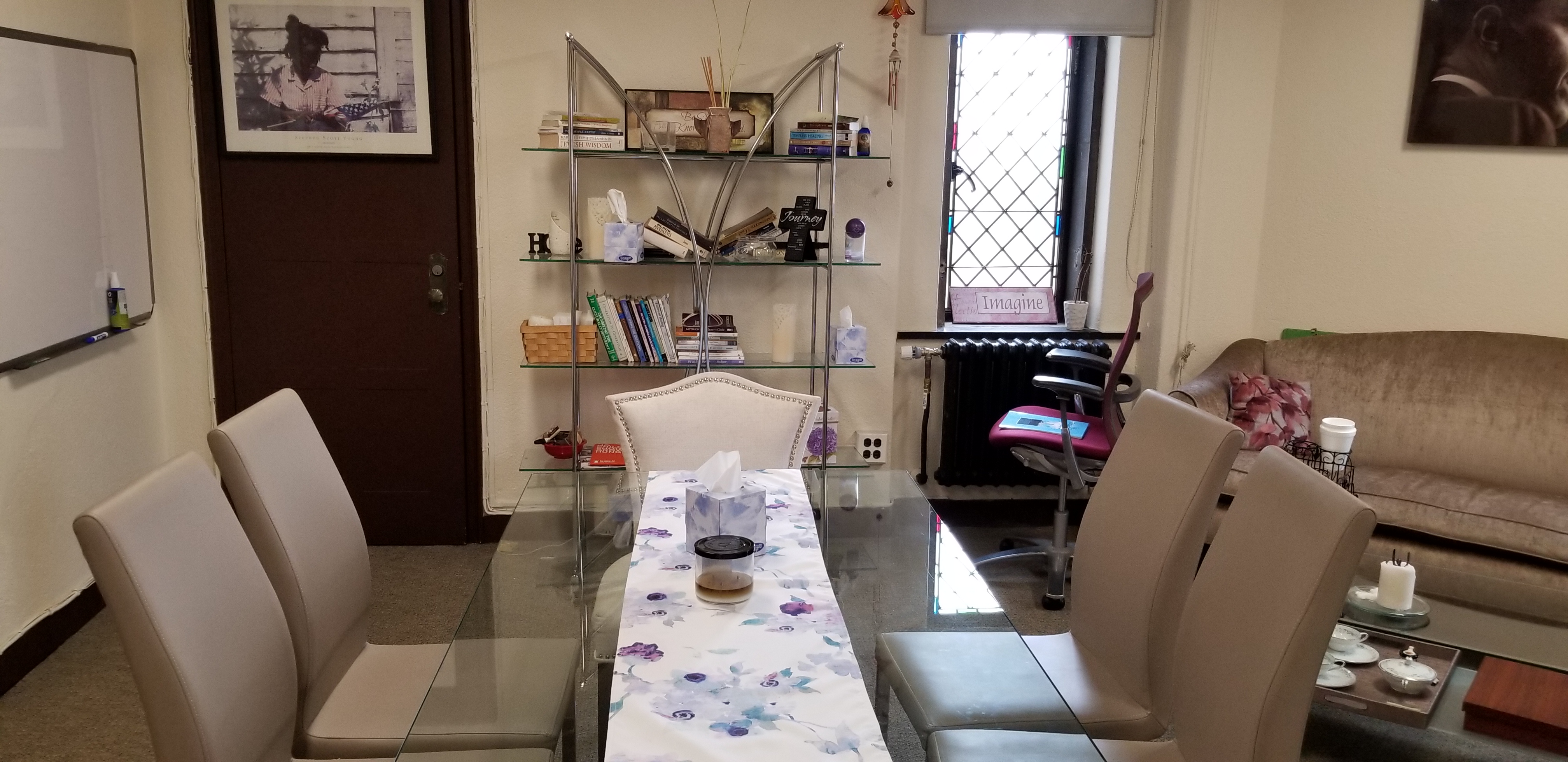 Church. It is one of the most impressive and detailed cathedrals I’ve ever seen, and its history is just as impressive. It was patterned after the cathedral at Chartres in France. But I must admit I looked forward to seeing Debra’s office because that is where the Matthew 5:4 meetings are held every other Tuesday. I got to see the table where everyone sits, and I got
Church. It is one of the most impressive and detailed cathedrals I’ve ever seen, and its history is just as impressive. It was patterned after the cathedral at Chartres in France. But I must admit I looked forward to seeing Debra’s office because that is where the Matthew 5:4 meetings are held every other Tuesday. I got to see the table where everyone sits, and I got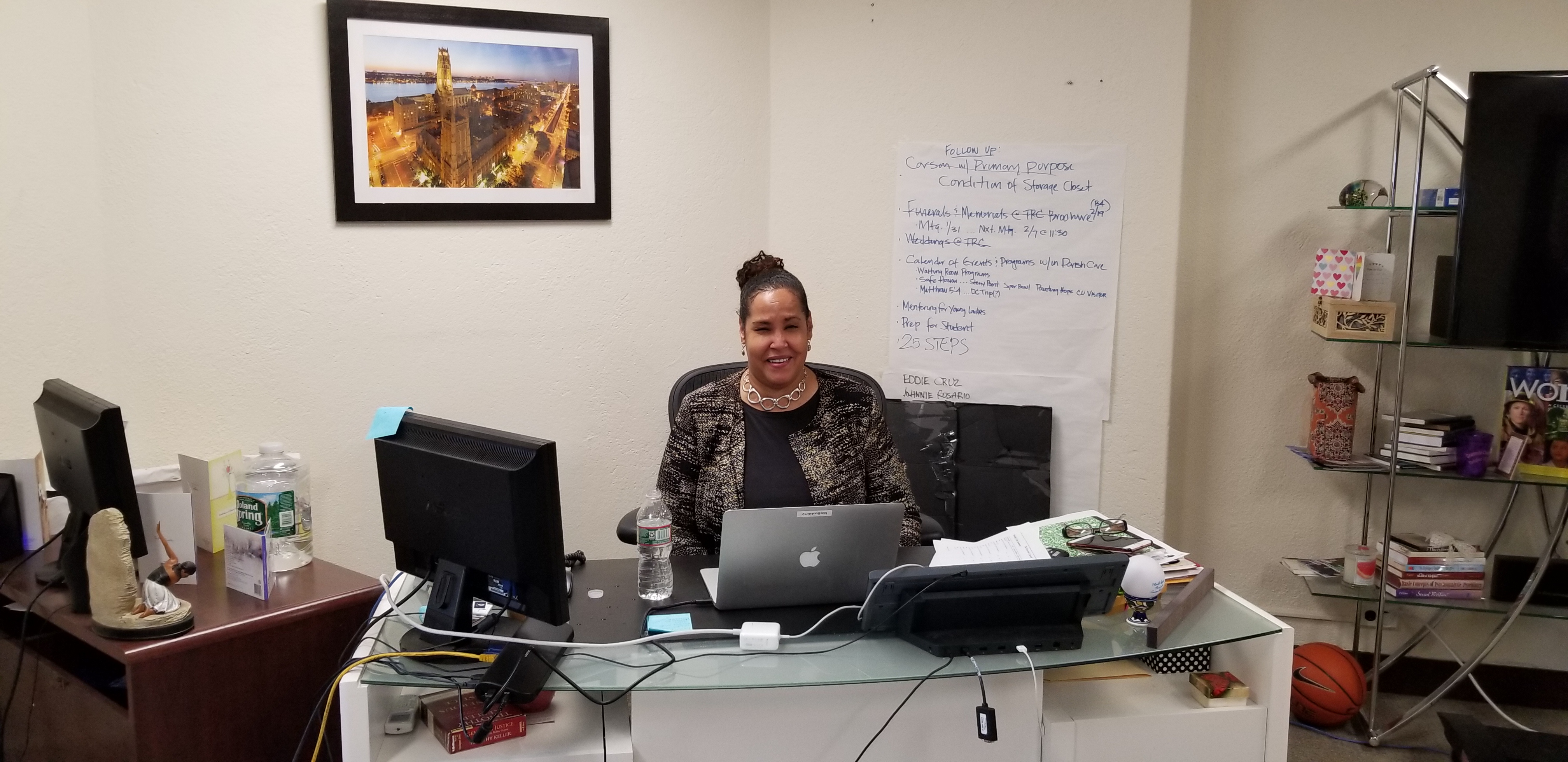 to see the ‘big screen’ at the other end of the table where I ‘sit.’ Debra is an amazing lady, and I am thankful that she hosts this group. She is thoughtful, kind, and compassionate, and I don’t think there could be a better person to help guide those who have lost a spouse than she. I am grateful and honored to be part of this ministry. I had Debbie take a photo of me standing in front of
to see the ‘big screen’ at the other end of the table where I ‘sit.’ Debra is an amazing lady, and I am thankful that she hosts this group. She is thoughtful, kind, and compassionate, and I don’t think there could be a better person to help guide those who have lost a spouse than she. I am grateful and honored to be part of this ministry. I had Debbie take a photo of me standing in front of  the TV to show everyone that I was “out of the box” for once.
the TV to show everyone that I was “out of the box” for once.
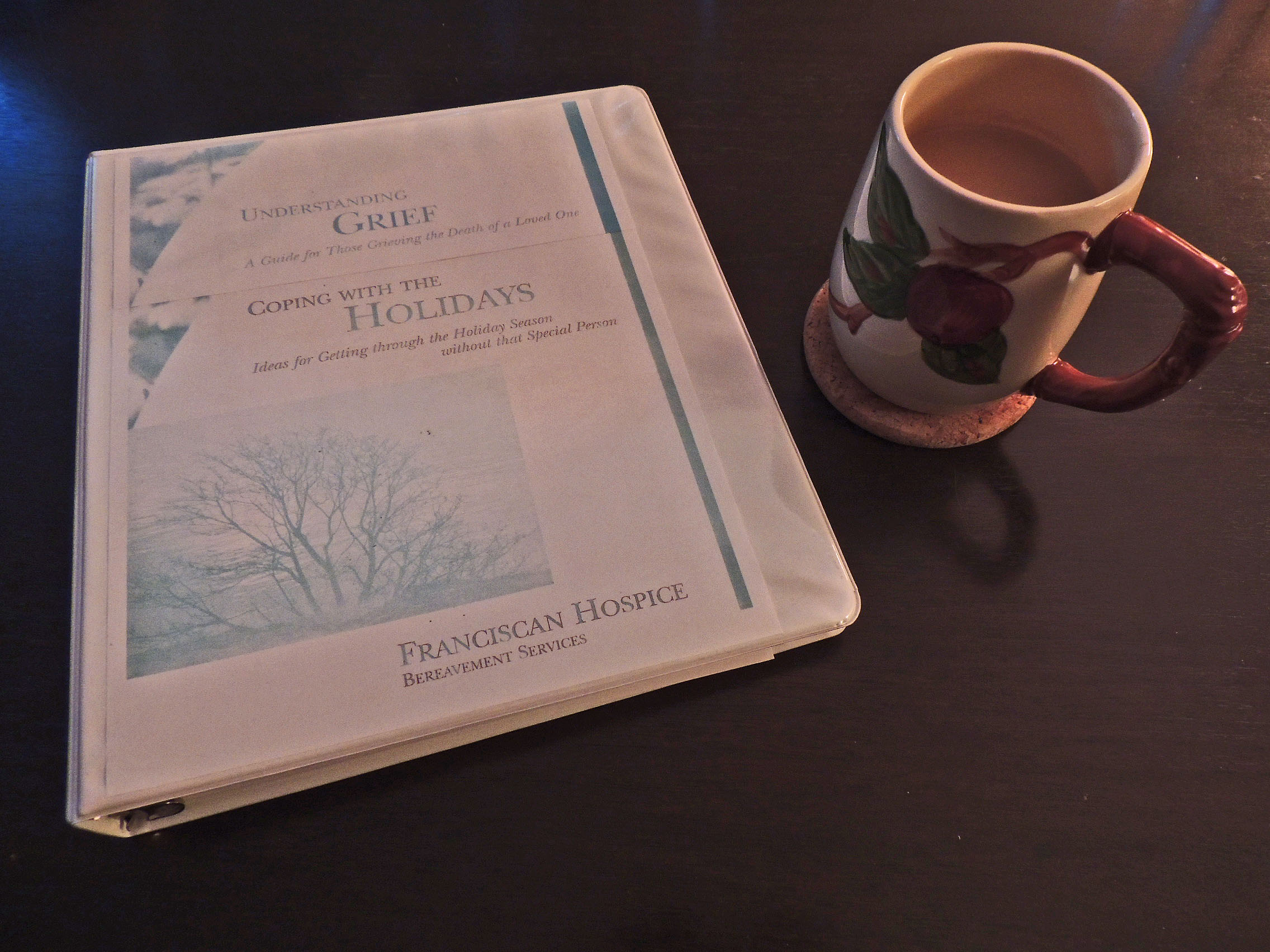 I endured my “Groundhog Day” (like the movie starring Bill Murray) for just over two-and-a-half months before I began attending my bereavement group sessions the following February 1. I do believe that making the call to attend those sessions was one of the better things I’ve done for myself. I needed to learn how to cope with Lou’s death. I was a fighter, not a griever, and I was at a total loss as to how to deal with my grief. I thought I was weak for wanting to go, for having to go. I’d rather have wrestled with God and lost, I’d rather have taken a bullet for her, I’d rather have taken her cancer for her and died in her place, but it was not to be. I had to stay and live with the emptiness, with the pain, and with the horrible loneliness without her. I thought I was alone in the way I felt, but found I was not. The group showed me that. I was among others who were experiencing the same emotions, the same guilt, the same anger, the same regrets, and the same thoughts as I, and I began to feel safe among those kindred spirits. I also began to learn that there is really strength in numbers and we formed some friendships that have survived to this day. And we learned how to cope, albeit slowly.
I endured my “Groundhog Day” (like the movie starring Bill Murray) for just over two-and-a-half months before I began attending my bereavement group sessions the following February 1. I do believe that making the call to attend those sessions was one of the better things I’ve done for myself. I needed to learn how to cope with Lou’s death. I was a fighter, not a griever, and I was at a total loss as to how to deal with my grief. I thought I was weak for wanting to go, for having to go. I’d rather have wrestled with God and lost, I’d rather have taken a bullet for her, I’d rather have taken her cancer for her and died in her place, but it was not to be. I had to stay and live with the emptiness, with the pain, and with the horrible loneliness without her. I thought I was alone in the way I felt, but found I was not. The group showed me that. I was among others who were experiencing the same emotions, the same guilt, the same anger, the same regrets, and the same thoughts as I, and I began to feel safe among those kindred spirits. I also began to learn that there is really strength in numbers and we formed some friendships that have survived to this day. And we learned how to cope, albeit slowly. It still wasn’t easy, and it certainly didn’t get better right away. Grief has a certain inertia about it that seems to be overcome only in small bits and pieces, and Time is one of the more important factors and forces that help nudge healing along. The interesting and sometimes maddening thing about Time is that there is no set amount of it that will help healing along. Time is a personal thing. It stands still, especially when one is grieving a loss. In grief, passing time can be more painful than passing a kidney stone because the pain of grief cuts through one’s heart and soul and there’s only one thing a person can take to ease that pain, though it’s something that the deceased would never want the survivor to take…one’s own life. I can say that, amid my pain and grieving, I began to understand why some surviving spouses, especially men, take their own lives. They couldn’t stand the pain and the loneliness and didn’t know how to cope with it. I am not ‘wired’ that way, though I prayed to God that he would take me in my sleep. I also began to understand why some survivors passed away within months of losing their spouses, whether men or women. One can die from loneliness and a broken heart. I wondered why I didn’t.
It still wasn’t easy, and it certainly didn’t get better right away. Grief has a certain inertia about it that seems to be overcome only in small bits and pieces, and Time is one of the more important factors and forces that help nudge healing along. The interesting and sometimes maddening thing about Time is that there is no set amount of it that will help healing along. Time is a personal thing. It stands still, especially when one is grieving a loss. In grief, passing time can be more painful than passing a kidney stone because the pain of grief cuts through one’s heart and soul and there’s only one thing a person can take to ease that pain, though it’s something that the deceased would never want the survivor to take…one’s own life. I can say that, amid my pain and grieving, I began to understand why some surviving spouses, especially men, take their own lives. They couldn’t stand the pain and the loneliness and didn’t know how to cope with it. I am not ‘wired’ that way, though I prayed to God that he would take me in my sleep. I also began to understand why some survivors passed away within months of losing their spouses, whether men or women. One can die from loneliness and a broken heart. I wondered why I didn’t. On my birthday in April, almost five months after Lou died and about a month after her birthday, I awoke and felt different. I laid there in wonder, because for the first time since she died, I felt good. I purposely thought about her, and I purposely formed the words, “She died, and she’s no longer with me,” and then I waited for the grief to flood through me. It didn’t. Only sadness did. I threw off the covers and sat on the edge of the bed. No crushing grief, no heartache, no pain. Only sadness. I got dressed, made the bed and went to the kitchen to make my coffee. I sat in the living room with my cup of coffee and wondered how, after almost five months, I could go to bed with a heartful of grief and awake feeling as though someone flipped a switch and turned it off. The first thing that popped into my head after that thought was, Happy Birthday to me. The pain was still a fresh memory. I still had the same thoughts, the same sadness, the same memories, but no more pain. I thanked God and Lou for this incredible gift. I felt I was on the verge of a new and different life now, and I began to feel hopeful for this new beginning.
On my birthday in April, almost five months after Lou died and about a month after her birthday, I awoke and felt different. I laid there in wonder, because for the first time since she died, I felt good. I purposely thought about her, and I purposely formed the words, “She died, and she’s no longer with me,” and then I waited for the grief to flood through me. It didn’t. Only sadness did. I threw off the covers and sat on the edge of the bed. No crushing grief, no heartache, no pain. Only sadness. I got dressed, made the bed and went to the kitchen to make my coffee. I sat in the living room with my cup of coffee and wondered how, after almost five months, I could go to bed with a heartful of grief and awake feeling as though someone flipped a switch and turned it off. The first thing that popped into my head after that thought was, Happy Birthday to me. The pain was still a fresh memory. I still had the same thoughts, the same sadness, the same memories, but no more pain. I thanked God and Lou for this incredible gift. I felt I was on the verge of a new and different life now, and I began to feel hopeful for this new beginning. decided to take the vacation that Lou and I planned before she was diagnosed with brain tumors. We had abandoned that vacation in favor of beginning radiation and chemotherapy treatments to stop the tumors. Sadly, none of it worked. I took my first road trip in twenty-eight years by myself in honor of her. I drove to places I’d never been to see things I’d never seen. The first day was the most difficult, but things only got better after that. I didn’t feel conspicuously alone. I began to enjoy my own company and be confident in it. I looked directly at strangers and smiled, and they smiled back! I drove almost 2,000 miles and took 1,400 photos. I was gone for two weeks. I love digital cameras!
decided to take the vacation that Lou and I planned before she was diagnosed with brain tumors. We had abandoned that vacation in favor of beginning radiation and chemotherapy treatments to stop the tumors. Sadly, none of it worked. I took my first road trip in twenty-eight years by myself in honor of her. I drove to places I’d never been to see things I’d never seen. The first day was the most difficult, but things only got better after that. I didn’t feel conspicuously alone. I began to enjoy my own company and be confident in it. I looked directly at strangers and smiled, and they smiled back! I drove almost 2,000 miles and took 1,400 photos. I was gone for two weeks. I love digital cameras!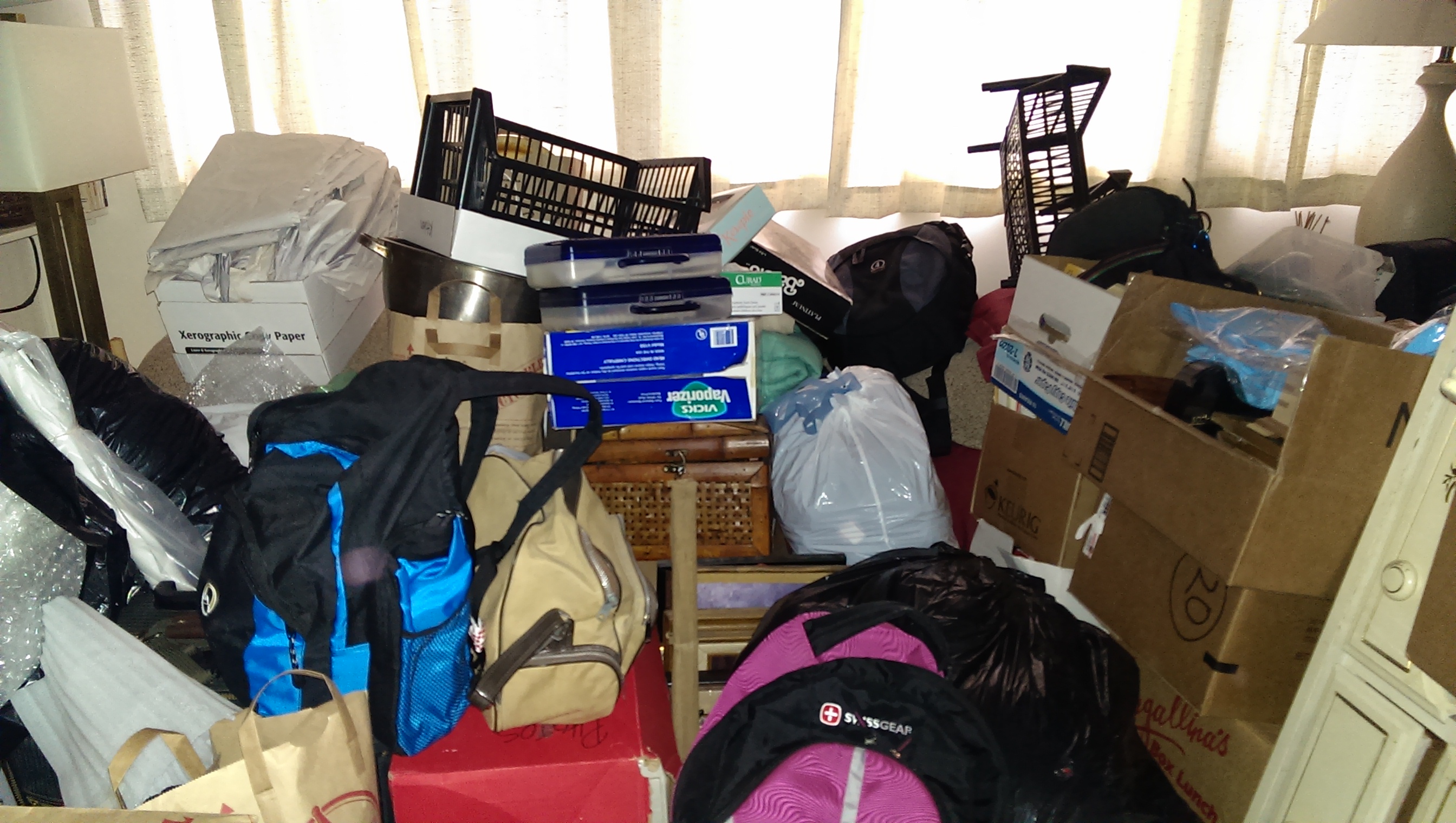 It was just three days after what would have been Lou’s and my twenty-ninth wedding anniversary, and about nine months after she died that I met Debbie, and my life changed once again. She and I fell in love. Upon returning to my home one day after visiting Debbie, I looked around the house and was stunned. I walked through every room and looked at it closely. I realized nothing had changed since Lou had passed away. I had been existing in a museum. I sat down and wondered where I was going to begin. I needed to make some changes in my new life. The following morning, I began in the master bedroom. I went through the large dresser and sorted Lou’s clothing into two bags…one for give-away, the other for throw-away. I kept nothing. Then I went through my clothing and sorted it into three piles…give-away, throw-away, and keep. The stuff I kept I put back in the drawers. I did the same thing with the other two dressers before I started on the closet. From there, I went to the guest bedroom that she used as her dressing room and went through the armoire, the closet and a small desk. I filled my truck five times with Lou’s clothing and took it to the Federal Way Multi Service Center, so they could give it all away to battered women who had nothing and needed to start over again. I thought it was the highest and best use for the clothing she loved. I took my unused clothing there, too, because they also gave it away to men’s shelters.
It was just three days after what would have been Lou’s and my twenty-ninth wedding anniversary, and about nine months after she died that I met Debbie, and my life changed once again. She and I fell in love. Upon returning to my home one day after visiting Debbie, I looked around the house and was stunned. I walked through every room and looked at it closely. I realized nothing had changed since Lou had passed away. I had been existing in a museum. I sat down and wondered where I was going to begin. I needed to make some changes in my new life. The following morning, I began in the master bedroom. I went through the large dresser and sorted Lou’s clothing into two bags…one for give-away, the other for throw-away. I kept nothing. Then I went through my clothing and sorted it into three piles…give-away, throw-away, and keep. The stuff I kept I put back in the drawers. I did the same thing with the other two dressers before I started on the closet. From there, I went to the guest bedroom that she used as her dressing room and went through the armoire, the closet and a small desk. I filled my truck five times with Lou’s clothing and took it to the Federal Way Multi Service Center, so they could give it all away to battered women who had nothing and needed to start over again. I thought it was the highest and best use for the clothing she loved. I took my unused clothing there, too, because they also gave it away to men’s shelters. I am rebuilding my life with Debbie now, and it feels good and right. Does that mean I have forgotten Lou? No. I never will. How could I? We spent more than twenty-eight years together and I learned so much from her and our marriage. That chapter in my life ended on November 23, 2010. A new chapter began the next day, and it began badly. Though it lingered in grief for a while, it has only gotten better by the day since then. Before Lou died, and before her brain tumors took her motor skills and memories from her, she gave me the most selfless gift ever. I didn’t remember it until months after she had passed away. She felt that she needed to give me permission to move on, should she die. She told me that she wanted me to find someone new and love them because I had too much love left in me to go to waste. Can you imagine that? How can I ever forget her?
I am rebuilding my life with Debbie now, and it feels good and right. Does that mean I have forgotten Lou? No. I never will. How could I? We spent more than twenty-eight years together and I learned so much from her and our marriage. That chapter in my life ended on November 23, 2010. A new chapter began the next day, and it began badly. Though it lingered in grief for a while, it has only gotten better by the day since then. Before Lou died, and before her brain tumors took her motor skills and memories from her, she gave me the most selfless gift ever. I didn’t remember it until months after she had passed away. She felt that she needed to give me permission to move on, should she die. She told me that she wanted me to find someone new and love them because I had too much love left in me to go to waste. Can you imagine that? How can I ever forget her?

 the time. I know she had a difficult time trying to care for both, because I heard it every day when I took the time to call her. All I can remember her asking is when I was going to come home. I know that she had no idea how I felt trying to take care of my mom and grieve for my dad, my mentor. I don’t believe she ever understood how I felt until her own father passed away years later, and I finally understood what my mother felt when I lost my wife to cancer in 2010.
the time. I know she had a difficult time trying to care for both, because I heard it every day when I took the time to call her. All I can remember her asking is when I was going to come home. I know that she had no idea how I felt trying to take care of my mom and grieve for my dad, my mentor. I don’t believe she ever understood how I felt until her own father passed away years later, and I finally understood what my mother felt when I lost my wife to cancer in 2010. For those who have friends who have lost a spouse or life partner but have not personally experienced that loss, I would ask of you to not try to push your friends back into “life,” or try to make them feel better. This will happen only when your friends are ready. You can’t fully understand what they’re going through or the emotions they’re feeling. The only thing you can do is to try to include them, “be there” for them, be patient, and let them talk if they feel like it. Above all, if they are friends, treat them that way. They are trying to figure out who they are all over again, they are trying to understand and get used to their new life as one, and these things are only going to happen on their time, not yours.
For those who have friends who have lost a spouse or life partner but have not personally experienced that loss, I would ask of you to not try to push your friends back into “life,” or try to make them feel better. This will happen only when your friends are ready. You can’t fully understand what they’re going through or the emotions they’re feeling. The only thing you can do is to try to include them, “be there” for them, be patient, and let them talk if they feel like it. Above all, if they are friends, treat them that way. They are trying to figure out who they are all over again, they are trying to understand and get used to their new life as one, and these things are only going to happen on their time, not yours. To A New Year! May it become better as the days pass. Some people make resolutions for the New Year…and they are mostly forgotten by the end of January. I think a good resolution to make would be to begin to appreciate the “little things,” like the smell of a rose, the taste of a great cup of coffee or tea, how beautiful a sunset can be, a moon-rise over the water, the smile of a child, the sound of a bird singing, or the look on a friend’s face when you tell them they are appreciated and loved. Life really is all about these “little things.”
To A New Year! May it become better as the days pass. Some people make resolutions for the New Year…and they are mostly forgotten by the end of January. I think a good resolution to make would be to begin to appreciate the “little things,” like the smell of a rose, the taste of a great cup of coffee or tea, how beautiful a sunset can be, a moon-rise over the water, the smile of a child, the sound of a bird singing, or the look on a friend’s face when you tell them they are appreciated and loved. Life really is all about these “little things.”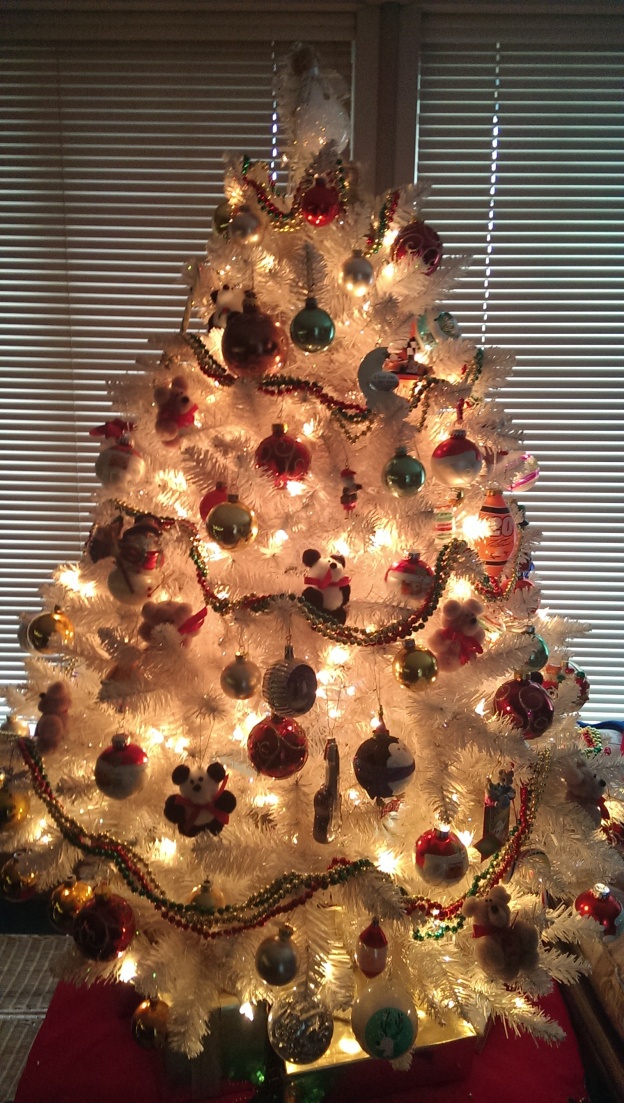
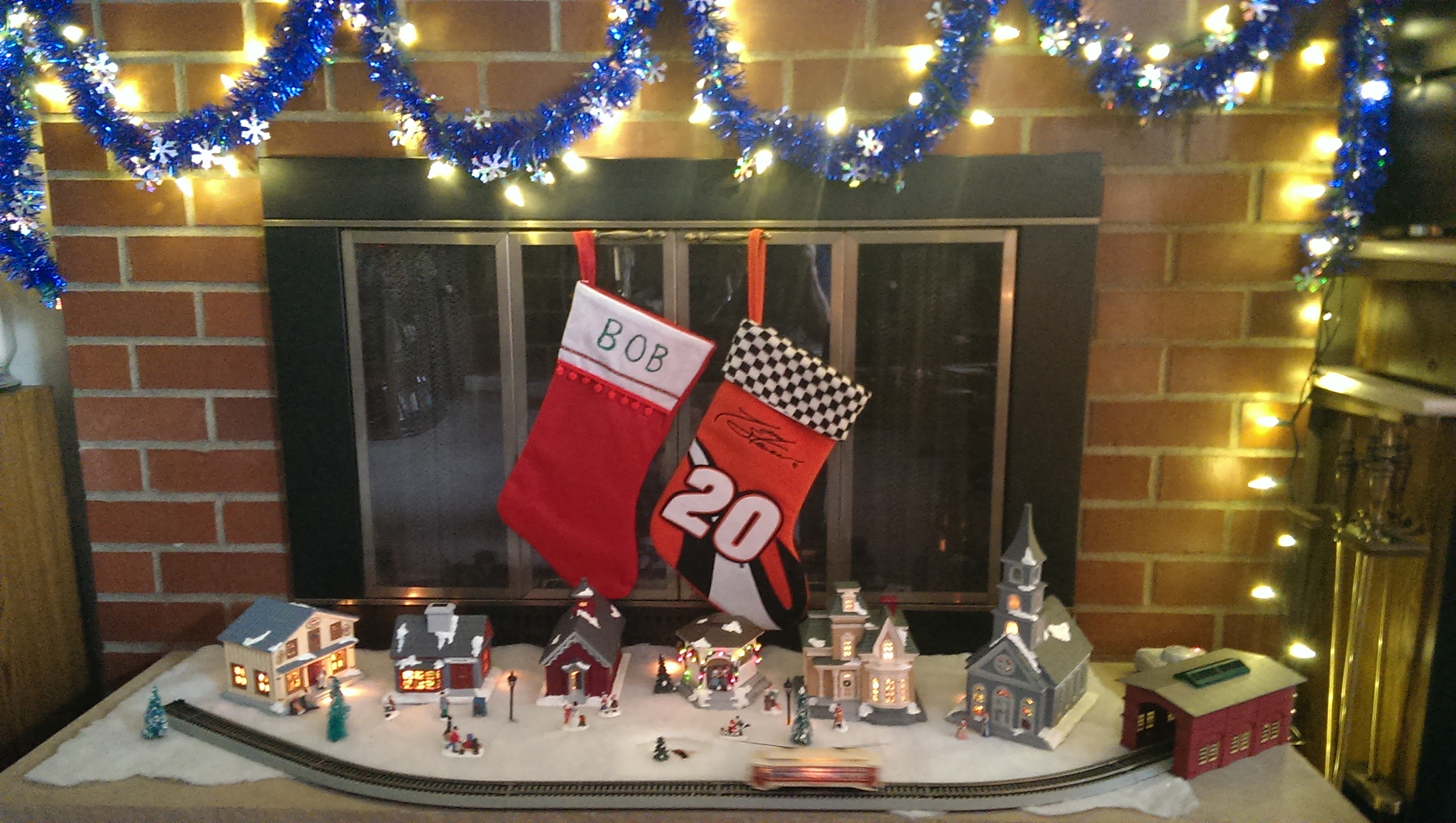 Christmas lights are up and burning brightly in almost all neighborhoods, Christmas trees are up and decorated, cards are signed and sent, and presents are being wrapped and hidden until Christmas Eve or Christmas Day. Children are filled with excitement, parents are filled with worry that they didn’t find what their children wanted, and almost everyone is stressed and tired from not being able to find what they’re looking for, including me. Though I found what I was looking for, I had to order it online and, of course, I received a notice that it was out-of-stock and would ship as soon as it arrived at the store…sometime in January. That will have to do. Yet, the season is upon us now, and tonight and tomorrow, Christian churches all over the world will be celebrating that Reason for the Season, the birth of Jesus. My hope is that this is not lost in the Christmas rush.
Christmas lights are up and burning brightly in almost all neighborhoods, Christmas trees are up and decorated, cards are signed and sent, and presents are being wrapped and hidden until Christmas Eve or Christmas Day. Children are filled with excitement, parents are filled with worry that they didn’t find what their children wanted, and almost everyone is stressed and tired from not being able to find what they’re looking for, including me. Though I found what I was looking for, I had to order it online and, of course, I received a notice that it was out-of-stock and would ship as soon as it arrived at the store…sometime in January. That will have to do. Yet, the season is upon us now, and tonight and tomorrow, Christian churches all over the world will be celebrating that Reason for the Season, the birth of Jesus. My hope is that this is not lost in the Christmas rush. I have been truly blessed in my life and that holds true today, though I saw little in my future except grief and a horrible, aching loneliness when Lou passed away seven years ago. That chapter of my life closed horribly with her passing, and a new chapter without her began badly. It was filled with grief, anger, loneliness and wanting to die. It took several months before I realized that I really didn’t want to die because I had things I wanted to do, places I wanted to visit, and things I wanted to see…for me. And my life began anew then. In retrospect, I never expected that I would write a book, The First Snow: A Journal of a Man’s Faith-Based Journey through Grief, be published, and find a second…and final…great love. But I did in Debbie, and I am so happy! And because of that book, I met a wonderful friend who has become a sister to me in Yvonne Broady, who also authored a book, Brave in a New World: A Guide to Grieving the Loss of a Spouse, as she lost her husband a year before I lost Lou. Thanks to Yvonne, I am able to “pay-it-forward” by co-facilitating a grief and comfort group named Matthew 5:4 at The Riverside Church of New York via Skype every other week, and have been doing so since May of 2016. This new chapter in my life, though it began badly, is getting better every day, and I do thank God for the gifts I have received along the way.
I have been truly blessed in my life and that holds true today, though I saw little in my future except grief and a horrible, aching loneliness when Lou passed away seven years ago. That chapter of my life closed horribly with her passing, and a new chapter without her began badly. It was filled with grief, anger, loneliness and wanting to die. It took several months before I realized that I really didn’t want to die because I had things I wanted to do, places I wanted to visit, and things I wanted to see…for me. And my life began anew then. In retrospect, I never expected that I would write a book, The First Snow: A Journal of a Man’s Faith-Based Journey through Grief, be published, and find a second…and final…great love. But I did in Debbie, and I am so happy! And because of that book, I met a wonderful friend who has become a sister to me in Yvonne Broady, who also authored a book, Brave in a New World: A Guide to Grieving the Loss of a Spouse, as she lost her husband a year before I lost Lou. Thanks to Yvonne, I am able to “pay-it-forward” by co-facilitating a grief and comfort group named Matthew 5:4 at The Riverside Church of New York via Skype every other week, and have been doing so since May of 2016. This new chapter in my life, though it began badly, is getting better every day, and I do thank God for the gifts I have received along the way.
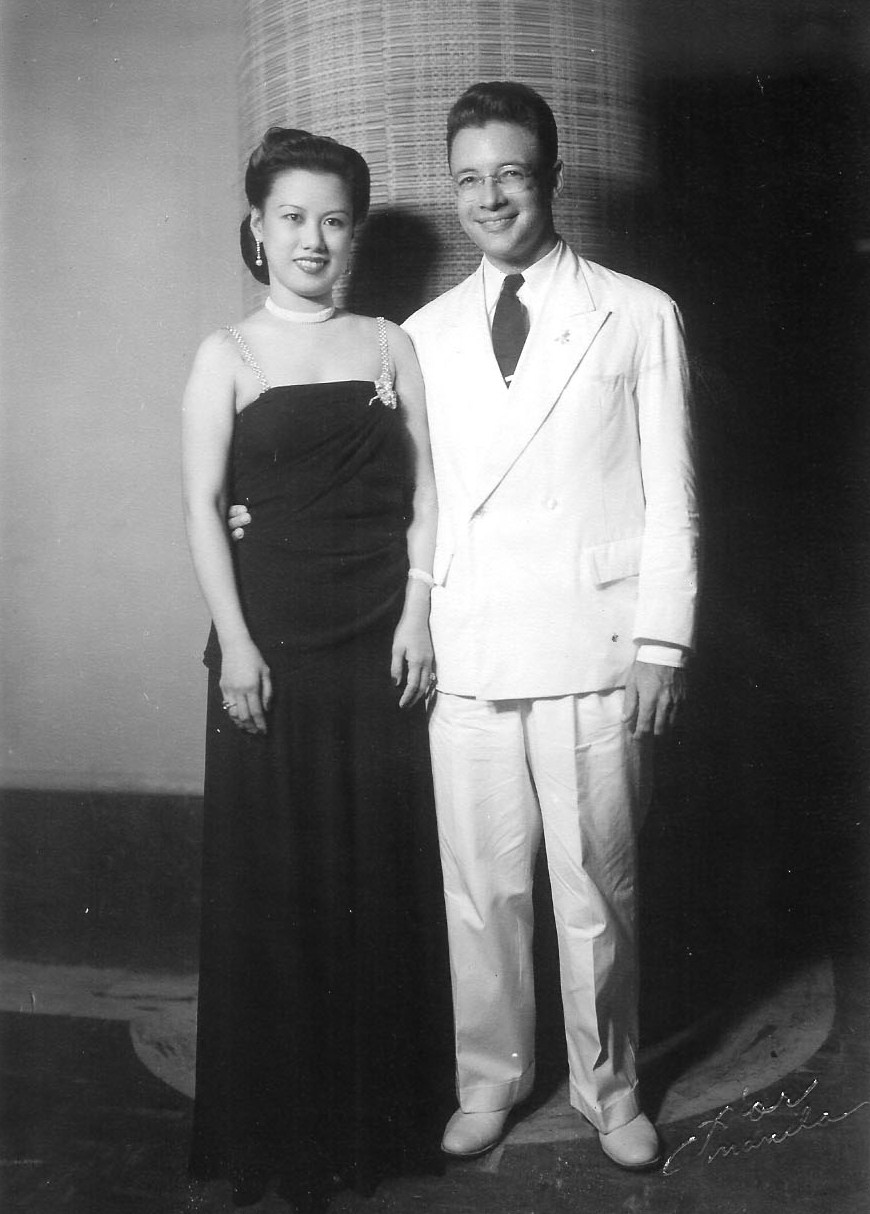 I’m not trying to be morbid or too funny here, but rather thoughtful of whoever survives me. You see, I’ve had to make funeral arrangements, with the help of my brother, for my father, who died suddenly at the age of fifty-nine, and then for my mother ten years later when she died from a massive heart attack at the age of sixty-six. I also had to make funeral arrangements for Lou, my wife of twenty-eight years after she died from cancer when she was sixty-five. When my dad died, my brother and I made the funeral arrangements and chose the casket, took care of the legal matters, paid the bills, contacted the church, talked with the priest, scheduled the service, and tried to let mom grieve and be there for her. Our grief for dad was set aside. Ten years later when mom died, my brother and I, once again, made the funeral arrangements and selected the casket, paid the bills, took care of the legal matters, called the church, talked with the priest, scheduled the service, and set our grief aside until all was done. But after it was done, I had to return to my family and my work, and put my grief aside again until so many years later, when Lou died.
I’m not trying to be morbid or too funny here, but rather thoughtful of whoever survives me. You see, I’ve had to make funeral arrangements, with the help of my brother, for my father, who died suddenly at the age of fifty-nine, and then for my mother ten years later when she died from a massive heart attack at the age of sixty-six. I also had to make funeral arrangements for Lou, my wife of twenty-eight years after she died from cancer when she was sixty-five. When my dad died, my brother and I made the funeral arrangements and chose the casket, took care of the legal matters, paid the bills, contacted the church, talked with the priest, scheduled the service, and tried to let mom grieve and be there for her. Our grief for dad was set aside. Ten years later when mom died, my brother and I, once again, made the funeral arrangements and selected the casket, paid the bills, took care of the legal matters, called the church, talked with the priest, scheduled the service, and set our grief aside until all was done. But after it was done, I had to return to my family and my work, and put my grief aside again until so many years later, when Lou died.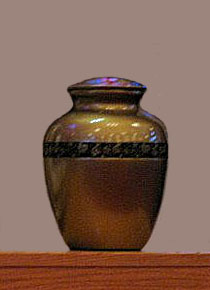 Once more, I had to make arrangements, this time for my wife. She wanted to be cremated, so I had to make those arrangements, choose a container, take care of the legal matters, contact Social Security, pay the bills, contact the church, talk with the pastor, schedule the service, write an obituary, and grieve. Amid my grief, I had to visit our attorney and the Social Security office and show them all her death certificate and review and sign so much paperwork. These things were not fun at any time, let alone when it was my own wife who died. At the same time, memories of making final preparations for my dad and mom came flooding back and added to my grief. It was almost unbearable. That was seven years ago.
Once more, I had to make arrangements, this time for my wife. She wanted to be cremated, so I had to make those arrangements, choose a container, take care of the legal matters, contact Social Security, pay the bills, contact the church, talk with the pastor, schedule the service, write an obituary, and grieve. Amid my grief, I had to visit our attorney and the Social Security office and show them all her death certificate and review and sign so much paperwork. These things were not fun at any time, let alone when it was my own wife who died. At the same time, memories of making final preparations for my dad and mom came flooding back and added to my grief. It was almost unbearable. That was seven years ago.